#Magritte is not at all into guns...
Text
Magritte realizing and revelling in the chance to Be Useful while she and Raf are living on Cortes Island--by getting the necessary BC licenses and bagging a white tail deer.
She makes Raf come along because he needs to help her bring the animal home, and also he's the only one who knows how to drive.
And Raf, upon fully coming to terms with the fact that there is now a carcass strung up and being bled in his shed is just like "...is this just a Canadian thing? This is just a normal thing people do, here?" And Magritte's like "yah!! I was like...four years old the first time my dad took me hunting for partridge." And then talking for hours about her hunting adventures with her dad when she was growing up. It has only been 3 years since her last trip with her dad, before she had to move out of her parents house--so not that long, at all. Her dad made her get her PAL the autumn after her 18th birthday--which saved her the trouble of having to go through that process by herself prior to moving to Cortes Island, at least.
Raf has...mixed feelings about staring his dinner dead in the eye before seeing it on his plate...until he actually gets to taste it; at which point, he decides it fine actually.
#hunting game for dinner is the true Canadian initiation. Congrats on ur honorary Canadian citizenship after this Raf lmao#would be her first time trying to skin and butcher a deer without her dad telling her what to do...it's not a beautiful job#but she manages it servicabley well!#hands numb from the cold.#Magritte is not at all into guns...#but she is super into TASTY MEATS.#so she will do the gun thing in service of procuring the delicious goods.#tw: animal death#the deer on the island are quite small#so that makes it easier for her to work with.
36 notes
·
View notes
Text




ㅤㅤㅤㅤㅤㅤㅤㅤㅤㅤㅤㅤㅤㅤㅤㅤㅤㅤㅤ━━━━━
ㅤㅤ𔓘ㅤㅤㅤMy DMs are always open to talk
ㅤㅤㅤㅤㅤㅤdon't be shy to message me anytime. :)
ㅤㅤㅤㅤㅤㅤplease use tone tags when interacting
ㅤㅤㅤㅤㅤㅤwith me ♡ ty.
ㅤㅤㅤㅤㅤㅤㅤㅤㅤㅤㅤㅤㅤㅤㅤㅤㅤㅤㅤㅤㅤㅤㅤ
𝐀𝐛𝐨𝐮𝐭 𝐌𝐞. ❀


ㅤㅤㅤㅤㅤHi, im Violet, and I'm a Ghost. Boo.
ㅤㅤㅤㅤㅤㅤㅤㅤㅤㅤㅤㅤㅤㅤㅤㅤㅤㅤㅤㅤㅤㅤㅤ
Hi, Im Violet, and I'm 18+, Please ask for my age in DM. Thank you ! I'm a She/Her, but I'm comfortable with any pronouns. I'm also a founder of the band called 'The Nomads' and lead singer. I am an INFP-T, My house is Slytherin, My Cabin is Cabin 5 Ares, and my Zodiac Sign is a Gemini. I am also a Semi-Literate Roleplayer, and I'm dead. lol.
ㅤㅤㅤㅤㅤㅤㅤㅤㅤㅤㅤㅤㅤㅤㅤㅤㅤㅤㅤㅤㅤㅤㅤ

Likes
Shows
American Horror Story, Breaking Bad, Tokyo Ghoul, NANA, Junji Ito, Bungo Stray Dogs, Skins, Euphoria, Chainsaw Man, Bridgerton, Hannibal, 13 Reasons Why, Mandela Catalogue, Happy Meat Farms, Local 58, Marble Hornets, League of Legends: Arcane ...
Movies
Scream, It, The Shinning, The School for Good and Evil, Heathers, Mean Girls, Wild Child, Jumanji, Sherlock Holmes, Enolma Holmes, Girl Interrupted, Twilight, Blade Runner 2049, The Perks of Being a Wallflower, All The Bright Places, The Breakfast Club, Thirteen, Harry Potter...
Musicals & Plays
Heathers, Be More Chill, Harry Potter Cursed Child, Beetlejuice,...
Books, Comic Books & Mangas
The Stranger, A Little Life, The Idiot, Inferno, NANA, Junji Ito, Chainsaw Man, Red Hood & The Outlaws, The New Teen Titans, Portraits of Dorian Gray, Harry Potter, Percy Jackson, Sherlock Holmes
Videogames
Left 4 Dead, Silent Hill, The Last of Us, Fatal Frame, Roblox, God of War, Undertale, Five Nights at Freddy's, Legend of Zelda, Life is Strange, Cyberpunk 2077, Mad Father, Sally Face, Alice in Madness, Franbow, Little Misfortune...
Music Artists
Mirah, Rob Zombie, Feeding People, Arctic Monkeys, Melanie Martinez, Gun N' Roses, Rolling Stones, The Kinks, The Strokes, Hole, Nirvana, Deftones, Panic! At The Disco, The Clash, The Killers, Hole, Radiohead, Chase Atlantic, The Neighbourhood, The Weeknd, Poppy, Mars Argo, Blur, Slowdive, Soundgarden, Ramones, Wisp, Strawberry Switchblade, Maneskin, Muse, Ice Nine Kills, Insane Clown Posse, Sleeping with Sirens, Joy Division, Sonic Youth, The Beatles, Pierce the Veil, Alice in Chains, Bikini Kill, Feeding People, Mother Mother, Paramore, My Chemical Romance, Ayesha Erotica, Ashnikko, Avril Lavigne, Three Days Grace, YUNGBLUD, Lil Peep, Kendrick Lamar, Pixies, Mazzystar, The Cranberries, David Bowie, Peneloppe Scott, Pearl Jam, Vocaloid, Widowspeak, The Smashing Pumpkins, Buzzcocks, Sex Pistols, The Smiths, Morrissey...
Artist
Gabriel Picolo, Michael Angelo, Carravagio, Salvador Dali, René Magritte, John Everette Millais, Federico Ferro ...
Authors
Edgar Allen Poe, Fyodor Dostoevsky, Brothers Grimm, Albert Camus, Franz Kafka, Sigmund Freud, Friedrich Nietzsche, Karl Max, Jane Austin, Virginia Woolf, Osamu Dazai ...
Dislikes
Loud Noises, Assholes, Narcissists, Egotistical People, Crowded Places, Musical Snobs
𝐒𝐨𝐜𝐢𝐚𝐥 𝐌𝐞𝐝𝐢𝐚𝐬
Discord: candied.vio.lets
Instagram: cxndiedvi0lets
Twitter: cxndiedvi0lets
Tiktok: cand.iedvixlets
Spotify: TheGhostofMyFormerSelf.

Tags
Violet Harmon Content: #candiedviolets
Personal Blogs: #ghoulblogger
Travel: #broomstops
Reviews: #cauldroncommentary
Asks: #1-800-necromancy
Poems: #theravenspoems
Music: #hauntingharmonies
Food: #forbiddenfruit
Art: #graveyart
Fashion: #witchywardrobe
Memes: #rollingoffthegrave
Writings: #mourningdoveliterature
Vents: #silentviolent

#ahs murder house#murder house#lana del rey#american horror story#violet harmon headcanons#violet harmon#violet harmon exacts#taissa farmiga#evan peters#ghoulblogger#Spotify#gaslight gatekeep girlblog#just girly things#im just a girl#girl blogger#girlblogger#cinnamon girl#girlblog#girlblogging#hell is a teenage girl#girl interrupted#gaslight gatekeep girlboss#girl blog#mean girls#girl interupted syndrome#girl hysteria#girl thoughts#american horror story murder house#esoteric#bio
104 notes
·
View notes
Text
Today I'd like to show all the Thoughts that we encountered in the game, but didn't end up Internalizing. I think that the more you see of these, the more of a complete picture you get of Harry.
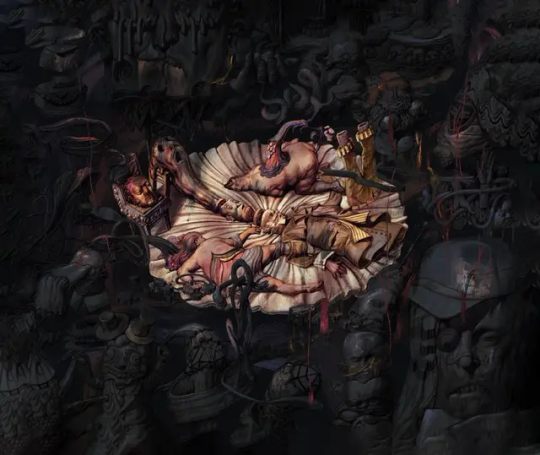
GUILLAUME LE MILLION
Temporary research bonus: -1 Logic: Head in the clouds
PROBLEM:
Whatever happened to Guillaume Le Million, who -- with his amber mane and sparkling teeth -- beguiled the tattered remains of the nation? While you suffered and suffered, did he dematerialize in a cloud of cocaine dust? Or did he simply stand in the corner and melt into the slendering *New* lines of some starlit boîte de nuit twenty years ago? Spare a thought for his great ass too! Or wait... maybe he became a police officer in Revachol West! Hmm...
Completion bonuses: +1 Pain Threshold: Blood oxygen is boring
All PSY learning caps raised by one
SOLUTION:
Bad news: Guillaume le Million did not become a cop. In '38 he went on a tour to the Hsin-Yao province in Safre, where he died of auto-erotic asphyxiation. His body was found hanging from a decorative dragon tree in his junior suite, amid drug paraphernalia, unwholesome objects, and the Sylvia Trainor single "Wonderland" skipping in the background. And yes, you can take this as a metaphor for Revachol in the Thirties. And also as a warning.
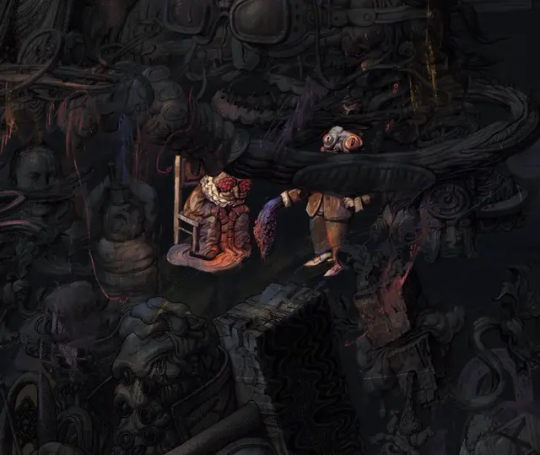
DETECTIVE COSTEAU
Temporary research bonus: -2 Conceptualization: An idiotic idea
PROBLEM:
Detective Raphaël Ambrosius Costeau -- when you say it, it feels like you're taking a bite of lemon meringue while sitting on the terrace of a seaside cafe. On a cool summer day. In Sur-La-Clef. It's everything you're *not*. You haven't created many things during your stay in Martinaise, but you've created this. A fancy, sophisticated name that makes you sound intelligent. And that no one seems to *acknowledge*. Don't you feel like you deserve a reward for coming up with something so special? And what would that reward *be*?
Completion bonuses: +1 Savoir Faire: This one sounds fancy, let's have this
+1 Esprit de Corps: Yup, fancy, let's have this one too
SOLUTION:
Monsieur Costeau, the reward for coming up with your classy new name has arrived. What are the attributes Detective Costeau should gain in? *Obviously* Savoir Faire and Esprit de Corps. You know *exactly* what they do and what those words mean. They're *refined*. Like *you*. You have a ton of that fancy stuff. And if the world can't accept Raphaël Ambrosius is your name -- you will always be Detective Costeau to yourself. R.A. Costeau -- sophisticated culture-detective. Specializes in ancient things and art.
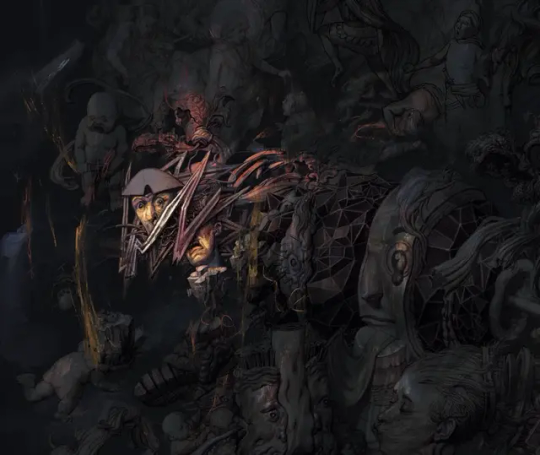
BOIADEIRO
Temporary research bonus: -1 Physical Instrument: Astra Country
PROBLEM:
It has been brought to your attention that there are men who live by the law of the land and the strength of their arms. Sunburnt, rugged, smoking men who explored the great rivery veins of upper-Magritte and tamed the Mundi wilds. Frontiersmen, cow-herders, philosophers -- the *boiadeiros*... with a gun in one hand and an unfiltered cigarette between their lips, these men made their own rules. What would it take for you to become one too?
Completion bonuses: -1 Esprit de Corps: Lone wolf
Cigarettes give +2 INT
SOLUTION:
Smoking, Harry. It will take a lot of tobacco-smoking for you to become a *boiadeiro*. Twin cigarettes fused to your lips and one hanging out of your nostril. In these tame, cultured times, without the sky’s dome above your head, the only way to be a true Franconigerian individualist is to smoke a lot of cigarettes. Light one up immediately. The smell of coffee brewing over a fire pit, a chestnut-flavoured morning. Welcome to Astra Country.
I'm not sure we ever actually encountered cigarettes in the course of our playthrough. Normally, they give +1 INT at the cost of 1 Health -- this improves the effect.
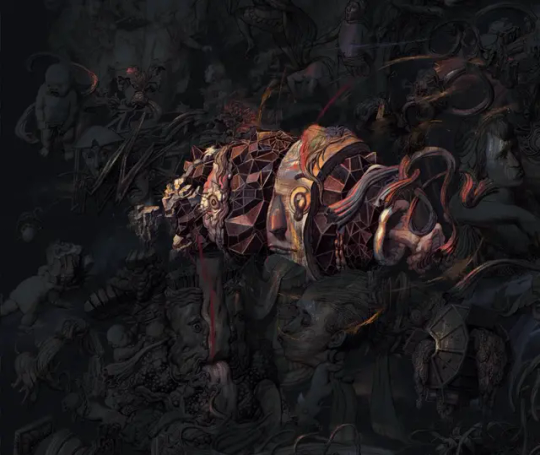
MAGNESIUM-BASED LIFEFORM
Temporary research bonus: -1 Shivers: No shakes
PROBLEM:
It is generally understood that human beings are carbon-based organisms, fusing little carbon tubes together to form complex, mushy structures capable of thought, love, and locomotion. It is also known that these structures sometimes like to “take the edge off” by consuming ethanol, amphetamine, etc. In such cases, it is important to supplement your body with magnesium. Tired? Mag it! Down? Mag time! Liver damage? MAXIMUM MAG! Some people say magnesium doesn’t really do anything and you just need to quit. What do we tell them?
Completion bonuses: +2 Volition: Magnesium receptacle glands
-1 Logic: No such thing, man
SOLUTION:
We tell them: HELL NO. You’re about to become a magnesium-based lifeform. The age of the primitive carbon-man is done. No longer must mankind rely on slow-working background radiation to take us further into our genetic destiny. This is the era of guided evolution, and magnesium is the key. You are the first of your species. The next step in human evolution. An advanced magnesium proto-man who mags it up, drinks it down, and sniffs it sideways!
A pretty useful Thought if you have low PSY.
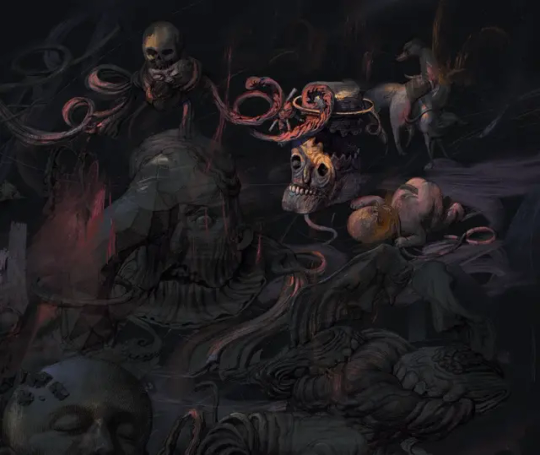
BRINGING OF THE LAW (LAW-JAW)
Temporary research bonus: -1 Rhetoric: Weird jaw
PROBLEM:
Hey, so a little observation. It's all cool, man. Don't freak out, but every time you say “I am the law“ -- and you say it *a lot*, it's basically *hello* for you -- your jaw does this *weird thing*. It sort of shifts sideways, hanging off your face at a jaunty angle, while the word *law* sounds oddly guttural and low. It's... strange. You wouldn't notice it, but after saying you're the law eighty thousand times, the question *does* come up: why *do* you have Law Jaw?
Completion bonuses: Learning cap for Hand/Eye Coordination raised to 6
Succeed all Hand/Eye Coordination passives
-1 Rhetoric: Jaw still weird
SOLUTION:
Okay, so. We now know why you have *Law Jaw*. Why you say *the law* in a weird manner, and why your jaw does that thing. You had polio as a child. You hadn’t gotten vaccinated. It must've been right after the Revolution -- not a lot of vaccine going around then. So you got infantile paralysis due to polio and this jaw thing is a complication from that. Admittedly, it’s not very funny. But you *overcame* it! This little infant survived and became a sharpshooting supercop. So: fuck you, polio!
This is a pretty useful Thought *and* it tells us something, in my opinion, pretty important about Harry.
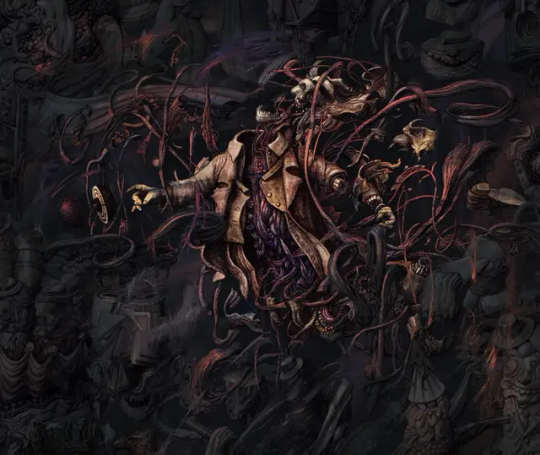
ANTI-OBJECT TASK FORCE
Temporary research bonus: -2 Pain Threshold: Hurts!
PROBLEM:
Take a look at your hands. See how bruised they are? See those little scars? This is Exhibit A. The material world is holding you back. Containers, mailboxes, doors, chairs -- they are all your enemies. Always have been. Atoms themselves are in on the conspiracy, forming shapes and structures that you hate. You are energy stuck in a body. You are spirit trapped in matter. Break free! Beat up that lamp post! Let it know just how much objects *suck*.
Completion bonuses: Attacking physical objects heals damage
+1 Pain Threshold: Thick skin
All FYS learning caps raised by one
SOLUTION:
Behold: the Anti-Object Task Force has assembled. God's avenging angel, arrayed against the lower emanations of the Darkened One: shoe racks, tape recorders, motor carriages. And doors. So many doors. You're not just pounding it all to pieces. You’re *reforging* the universe. From the anvil of the heavens to the worms below. Indulge in it. Be bold. Have an *impact* on the shape of Creation. Out of the furnace of your rage -- a new reality! Also, you should trash your room *again*.
The first bonus here is not as useful as it sounds, because by the time you unlock this Thought, you'll have already been through most of the attackable things in the game. The rest is still pretty good, though.
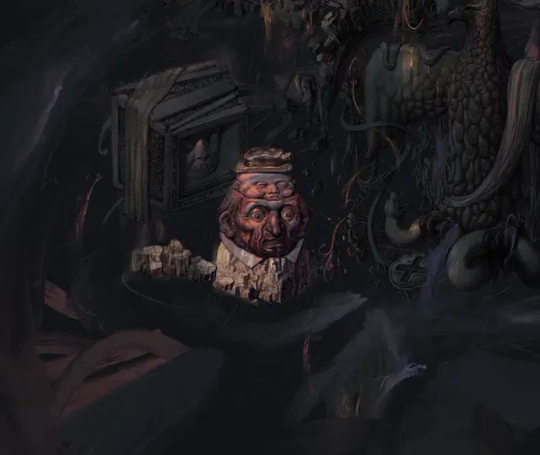
DATE OF BIRTH GENERATOR
Temporary research bonus: None
PROBLEM:
Your face looks like it’s 58 and your body feels like it’s 60. Your mind feels like it’s lived for one day or a hundred. Both longer than they ought to be, the day and the century.... But for how long, then, has this thing attached to your sentience walked the planet’s crust? Time to start racking those brains of yours, Elder One. When and where were you born?
Completion bonuses: Learning cap for Logic raised to 4
-1 difficulty to all Physique passives
SOLUTION:
You were born in the year ‘07, in the last year of the Commune of Revachol, right before it fell. In the Old Military Hospital, on the ground floor where people usually came to die, during a snowstorm. The Revolution had about one year left to go and the fires were still burning bright. There were explosions in the blizzard. This was 44 years ago. You are 44 years old. The bloating might never leave your face, but beneath it -- you still have some years. You still have some hope.
I believe you can talk about this with Kim once you have the answer.
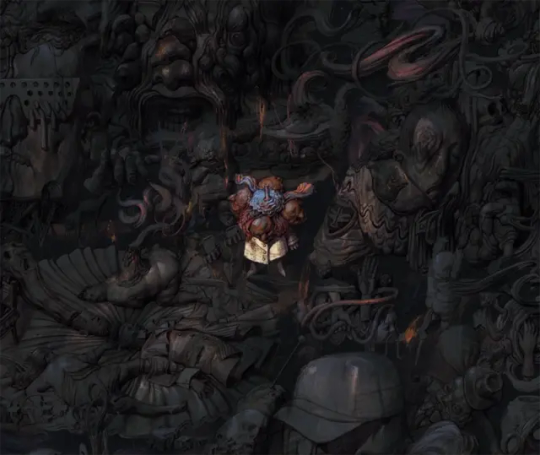
ARNO VAN EYCK
Temporary research bonus: +1 Interfacing
PROBLEM:
The question won’t leave you – why did the melody line from a broken and discarded tape fit perfectly into a song played by some speedfreaks in a frozen tent? Can it be a coincidence? Maybe it’s the hand of the Man-Machine himself, in his attempt to craft a perfect song. Maybe Egg Head is actually Arno van Eyck in disguise!? Eyck? Egg? Hmm...
Completion bonuses: All white Motorics checks unlocked
Reveals Arno Van Eyck gig posters in the world
SOLUTION:
Okay, so Egg Head is clearly not Van Eyck in disguise. Van Eyck is an Oranjese disc jockey -- but those people get around. Especially in Revachol, in the clubs on Boogie Street. Perhaps he stayed here for a short stint and discarded part of the song he was working on. Just threw it away. And then it ended up in the hawthorn tree. But why? Did he think it was *retrograde*? It wasn’t. Perhaps he caught a glimpse of the future and did not want for it to arrive just yet. Perhaps the city whispered the topline to him and he was frightened by it?
We've seen variations on this one before for other skill categories. The Arno Van Eyck posters give you additional orbs to click, which synergises nicely with Jamais Vu.
Egg Head also directly told us that his name was in reference to Van Eyck at one point, so that was not really much of a mystery.
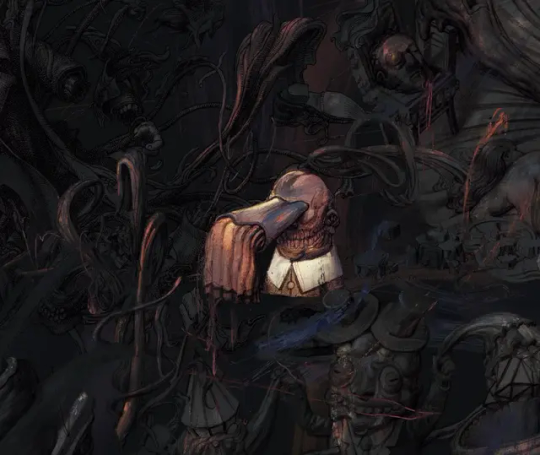
SEARCHLIGHT DIVISION
Temporary research bonus: None
PROBLEM:
Missing persons cases just really get to you. It's hard watching people worry about their loved ones – the little nervous movements, the dark rings around their eyes from sleepless nights. And even if there are no loved ones waiting – you like to have all your ducks in a row, and it really bothers you when whole entire people aren't accounted for.
Completion bonus: +2 Perception: Clear-eyed pursuit of truth
SOLUTION:
You've sharpened your senses by being on the lookout for missing persons. Now you notice more of what's happening around you. Perhaps when you're done with this case, you can join the Searchlight Division of the RCM, and find every Revacholian that's ever gone missing without a trace (there is undoubtedly a backlog of such cases). Because you never know, a missing person could be just around the edge, barely out of sight.
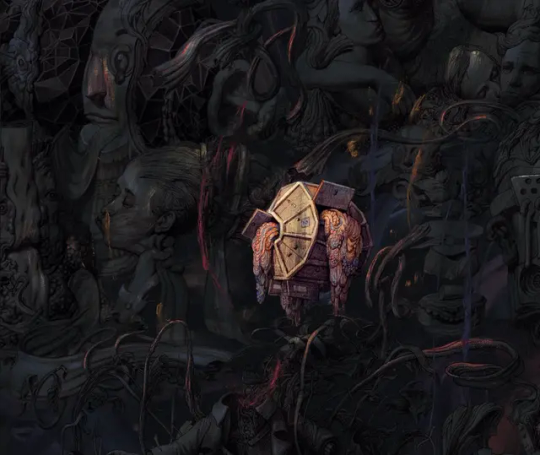
ONE MORE DOOR
Temporary research bonus: +1 Half Light: What is behind it?
PROBLEM:
God dammit, it cannot be. A disgrace! That door on the coast... you remember the one, right? The one that leads to the abandoned supply depot? Why, in the name of all that's holy, does it not open? *Why*?! There *has* to be a way to get through that unopenable door. By gods, you're the police -- all doors are supposed to open before you. What will the others at the precinct think if you can't open a goddamn door? There must be a way.
Completion bonuses: -1 Half Light: No fear
All PSY white checks unlocked
SOLUTION:
There is no way to open the supply depot door. Accept it. You cannot open *all the doors*. You have to integrate this into your character. Some doors will forever remain closed. Even if every single other door will open at one time or another, maybe to a key, or maybe to some sort of tool meant for opening doors... But this one will never accede to such commands. A realization crucial to personal growth. Crucial.
There will always be one more door.
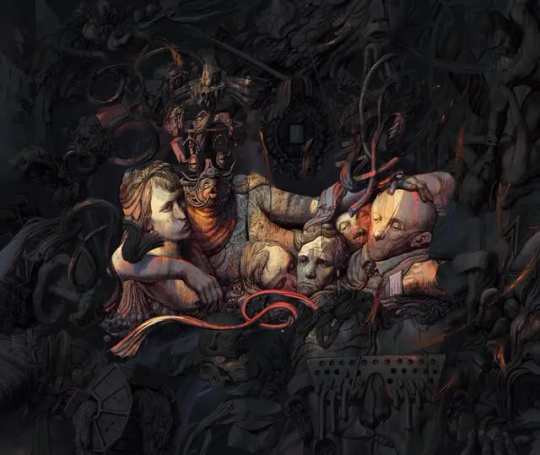
HARDCORE AESTHETIC
Temporary research bonus: -2 Interfacing: Fuck grammar!
PROBLEM:
Not only have you internalized the Hard Core Aesthetic, you’ve also *contributed* to it. How harder-core could you possibly become? Low-core people come around you to correct your “typos”: it’s “Hardcore” here, “hard-core” there, “Hardorcore” in a third instant -- what’s going on? Those aren’t typos, man, that’s how core hardness works. If you don’t know “hard-core” from “Our Happy Hardcore,” what the fuck are we even talking about?
Completion bonuses: +1 Endurance: Really useful for doing drugs
+1 Volition: Same thing, Hardman
SOLUTION:
Oh yes. Drugs. We’re talking about drugs. Let’s face it, these flirtations with the Hard Core Aesthetic have all been leading up to one question: Can I do drugs *harder* now that I’m a Hard Cop? And the answer is: yes. You can. You can do one more blast of pyrholidon and yellow shit-powder, you can even pull a ciggie and a lager on top of that. There. You’ve *truly* made the Hardcore your own thing now.
Despite what it says on the tin, this actually just gives you more health.
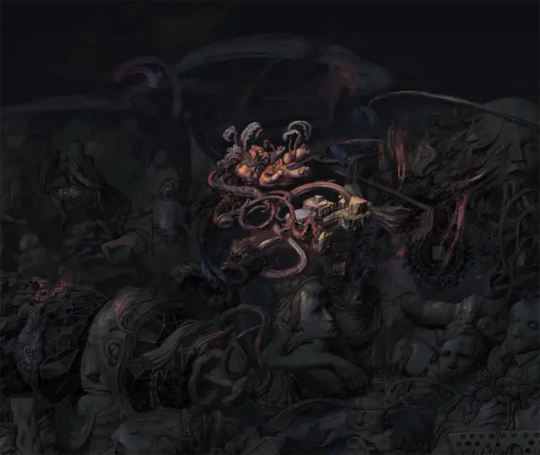
THE INSULINDIAN MIRACLE
Temporary research bonus: None
PROBLEM:
You were reminded of a poem, somewhere deep inside you, the translation of which you don't remember… "Nulla sarà cambiato della luce!” it begins. “Colori come grigio e marrone / Tutti stampati uno sull’altro / Trovai un vuoto / Una macchia Bianca / Gli altri guardarono / “Che bella giornata! Che bel tempo!” / Ma sentii la rotativa." You were reminded of it when you heard about the discovery of Insulinde. But what does it mean? And how do you know it by heart?
Completion bonuses: All white checks unlocked
SOLUTION:
It’s easy. You know the poem by heart because you were taught it at school. It is one of the Volta do Mar mantras repeated on the voyage that lead to the discovery of the Insulindian isola. And the words mean: “Nothing will be changed about the light! / Colours like grey and brown / All printed on top of each other / I found a blank white spot / All the others looked up: / ‘What a beautiful day! What beautiful weather!’ / But all I heard was the printing machine." What strange words to celebrate a new world.
You can only unlock this Thought when talking with Joyce after the confrontation with Ruby, making it a really useful tool if you have anything left to do in the game at that point.
And that's all the Thoughts that we encountered in our playthrough, aside from the ones we already saw in the game proper. We did also *technically* get to the point where we could have seen the Thoughts for the moralist and ultraliberal political alignments, even if we chose not to opt into them. So, I'll show those too:
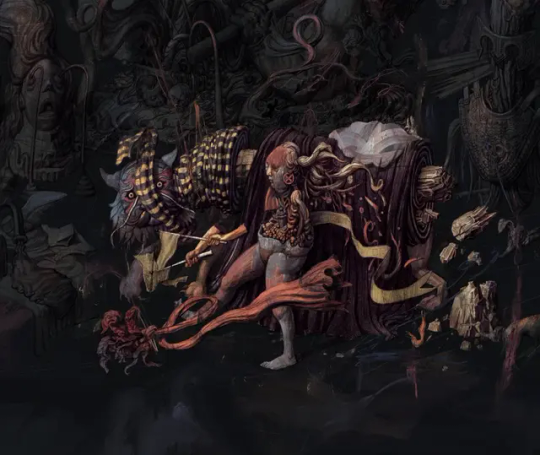
KINGDOM OF CONSCIENCE
Temporary research bonus: -2 Half Light: Calm water
PROBLEM:
Heartache is powerful, but democracy is *subtle*. Incrementally, you begin to notice a change in the weather. When it snows, the flakes are softer when they stick to your worry-worn forehead. When it rains, the rain is warmer. Democracy is coming to the Administrative Region. The ideals of Dolorian humanism are reinstating themselves. How can they not? These are the ideals of the Coalition and the Moralist International. Those guys are signal blue. And they're not only good -- they're also powerful. What will it be like, once their nuanced plans have been realized?
Completion bonuses: Moralist dialogue heals 1 Morale
Learning cap for Volition raised to 5
Learning cap for Logic raised to 5
SOLUTION:
The Kingdom of Conscience will be exactly as it is now. Moralists don't really *have* beliefs. Sometimes they stumble on one, like on a child's toy left on the carpet. The toy must be put away immediately. And the child reprimanded. Centrism isn't change -- not even incremental change. It is *control*. Over yourself and the world. Exercise it. Look up at the sky, at the dark shapes of Coalition airships hanging there. Ask yourself: is there something sinister in moralism? And then answer: no. God is in his heaven. Everything is normal on Earth.
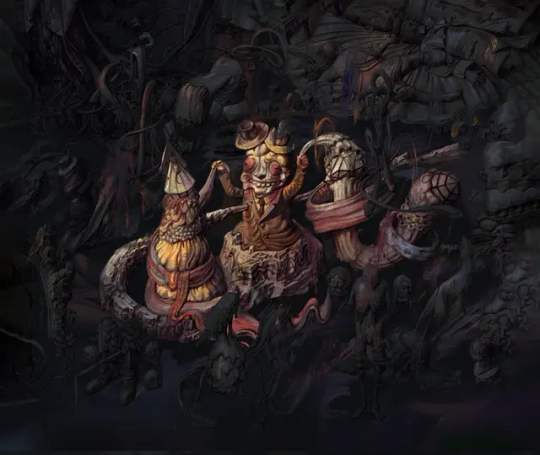
INDIRECT MODES OF TAXATION
Temporary research bonus: -2 Empathy: Cold blooded
PROBLEM:
First, if you have a side-bitch ideology cooking somewhere, don't sweat it. Fightin' indirect taxation for the Gossamer State is compatible with *all* creeds. It's cool like that. You're a cool anarchist now. Unless you don't want to be an anarchist. Whatever! Stuff this meal ticket in your eye-socket and let's see if we can steal some *love* back from the robber barons at the customs agency and the *banditos* at The Insulindian Financial Oversight and Competition Committee.
Completion bonuses: -1 Empathy: Thinks he's a hustler or something
Ultraliberal dialogue options give +1 real
SOLUTION:
Turns out those Financial Oversight Committee gangsters stuffed millions of hard-earned dividends away in the last place anyone thought to look: the hearts and minds of everyday Revacholians! You need to spread that deregulation gospel to the *people*. Tell them about that foreign fare tax. Preach that 98% gross burden. Preach it, preacher man! Set the brothas free. Taxes are racist.
Even with those, there are still *eighteen* Thoughts remaining in the game that we didn't encounter - either because we didn't have high enough stats, didn't pick the right dialogue options, or chose not to put any points into fascism. Some of them are mutually exclusive with Thoughts we did pick, some require *really complicated* methods to find. A few of them give us some more interesting backstory on Harry and Kim that's worth hearing -- but I'll let you uncover that on your own time.
28 notes
·
View notes
Text
Art and Artists, September 1966

Cover by René Magritte, L’Art de Conversation

Dining with Jim
Robert Fraser talks to Jim Dine about London and New York
Pp 48-53
The entire interview is under the cut, along with scanned pages of Dine's art from that issue.
Here's a quick cheat sheet for potentially obscure references:
Louis Seize: the architecture or furniture of the reign of Louis XVI of France
Paolozzi: Eduardo Paolozzi, Scottish artist known for his sculpture and graphic works. He had shows at the Robert Fraser Gallery.
Richard Hamilton: British painter and collage artist. He produced a series of prints, Swingeing London, based on Robert Fraser's arrest, along with Mick Jagger, for possession of drugs.
Biba: London fashion store of the 1960s and 1970s.
Nancy: Nancy Dine, American filmmaker, married to Jim Dine.
Dada: Art movement of the early 20th century, which rejected rejected the logic, reason, and aestheticism of modern capitalist society, instead expressing nonsense, irrationality, and anti-bourgeois protest. Surrealism was a branch of Dadaism.
Furlined teacup: Luncheon in Fur, surrealist art by Meret Oppenheim. In 1936, Oppenheim wrapped a teacup, saucer and spoon in fur.
Oldenburg: Claes Oldenburg, Swedish-American sculptor. He had shows at the Robert Fraser Gallery.
Robert Morris: American artist who was one of the central figures of the Minimalism movement.
Alloway: Lawrence Alloway, American art critic and curator.
George Cohen: English footballer who was awarded an MBE in 2000 for his many victories on the field.

Robert Fraser: This room is where you have been doing all the work that you have done so far in England?
Jim Dine: Yes. Just in this room, which I felt was a good place to contain it because the room is absolutely not about making anything. It’s what you’d call extra, like the game room or the hunt room with those horns and the Oxford oar and all that sort of Louis Seize business over there and the scrap books and the globe and the flowered wallpaper and the book shelves and the shot-gun shelves and the sherry bottles and all that sort of, you know, contract bridge manuals and the like. I mean it’s so completely not mine that it might as well be all white. It seems to me you could make anything in here.
RF: Yes. But it seems to be so far removed from your actual world.
JD: Absolutely.
RF: And also has a certain aimless incongruity which obviously has had an effect on you.
JD: Right.
RF: Or on what you’re doing.
JD: Absolutely. Absolutely. It’s really like a sounding board for all kinds of freedom. You know, so that one doesn’t feel type cast into making one thing here. I mean I feel like I could make a thousand different kinds of things in here.
RF: Is that more or less the sort of reaction that you’ve had in general to the landscape and general tone of life over here?
JD: Yes, and it’s because I’m not at home. You know, it’s the ‘sailor on leave’ theory. It’s like not being here, not having to answer to anything at home in New York. Being in England, then you do something different. I don’t think I could live here. At home, expatriation is not interesting to me, but as a visitor it’s interesting to see what one does purely by associating things.
RF: But are there any special freedoms or reactions or inhibitions which you’ve felt responses to, which you think are particular to London itself?
JD: Oh yes. I feel terribly much like a refined person in New York, but here I feel like a woodsman or something. I feel like a bull in a china shop, bustling through London. I never feel I’m as civilized as the natives or the artists who live here, because they seem so much part of one scene. No matter what kind of image they make – except for Paolozzi. He’s the only one who’s international. One gets the feeling he need not be anywhere; this is strictly owing to the kind of hermetic atmosphere here.
RF: This is not because you feel culturally unsophisticated?
JD: Oh, no, no, no. It’s because it’s like walking into a green-house where there are these rare plants.
RF: Would you say that this very hermetic atmosphere has brought a sudden reaction to art in this country?
JD: I think it’s obvious. I mean, One doesn’t have much trouble knowing what an English painting looks like. And there’s this sort of sense of personal freedom over here that one never feels in America. In America, one always feels like you have both hands up ready to sustain the blow.
RF: Yes.
JD: And here you needn’t even be on guard at all. There’s not that undercurrent of violence or, and I don’t mean physical so much, intellectual violence of a particular kind of chauvinism of things. One’s paranoia isn’t fed very easily here, as it is in America.
RF: Well, this would seem fairly necessary to the production of a work of art at the moment, wouldn’t you say so?
JD: What would seem necessary?
RF: This atmosphere of impending violence …
JD: Well I feel that I like the tension of New York because of the whole idea of living that way (of being on one��s guard). I like to be the block of wood against the piece of sandpaper. I like the abrasive quality, not the sweet quality.
RF: This lack of tension seems to be particularly noticeable in the art world here.
JD: The art world here is really a group of people who aren’t terribly related, it seems to me, except for the fact that they all live here so they have no choice. They may have an underlying bitchiness about each other, but there is a niceness about the whole thing that puts one off one’s guard. I don’t understand it all the time you know.
RF: But also this great detachment might be a good climate for an individual who is already so far evolved that he doesn’t need the whole bit.
JD: Yes. Oh sure.
RF: Somebody like Paolozzi or Richard Hamilton, for instance.
JD: Yes, but they’re mature artists so that’s not what I mean. I’m saying that for a young artist to live here I don’t know what it means. You know, I went to see those kids in the Royal College and there’s no question that they should be in America.
RF: Is that something to do with the way art is taught here or just the lack of attention which is being paid?
JD: No, it’s about being a presence in your world and here … you can’t get a sense of other people or other things being made, which you have in America. It’s only you.
RF: It has always seemed to be that art in England is so official.
JD: Yes, it’s easy to be an artist here, but in America it’s not. In the first place in American everybody thinks you some kind of social misfit if you’re an art student, and in terms of percentages, very few people go to art school in America. Most go to colleges where there is an art department, so it’s a different thing. It’s not as easy to be an artist there as it is here, although there are less here for some reason. They are all able to go to a place called the Royal College; that’s too much. It’s like coming on so fresh and strong. It puts such a seal on it. It’s beautiful, but of course it doesn’t mean anything. That’s what I mean about the lack of abrasions. The personal freedom aspect and the aspect of allowing everything has its advantages. I mean I like the whole scene here. The clothes scene; I like to be able to wear what I want to wear and not give a f… about anything, but one would feel that being an artist here you’d also be allowed to do whatever you wanted to do and that isn’t right either. That’s something criminal that gets in.

RF: Yes, but it seems to be that the screen of renaissance that has been broken through in terms of fashion and so on and hasn’t actually gotten through to the artist …
JD: Well, fashion it’s easy. Because fashion is so like that (clicks fingers), you know, quick.
RF: Yes, but there’s a certain atmosphere here which makes one feel that the most extreme things are happening over here but you don’t feel that in painting yet.
JD: Not here. No. Not extreme. You see it’s still easy to be a painter here. There are wall spaces available. You’d still be a 19th century painter here. In America you can’t be an artists. I mean it’s always something wrong to be an artists or even to be able to make a painting in America at this point.
RF: Would you feel that, for instance, just the very fact of this type of environment would make you paint differently here if you had to? It wouldn’t be incongruous to pain with oil paints for instance.
JD: It wouldn’t be incongruous. But I wouldn’t paint. If I lived here, I would do something else. But I would be too tempted. I mean, I don’t trust myself. It would be like a drug situation, you know. Being surrounded with hash or something because it’s like …
RF: Self-indulgence?
JD: Yes, it would be so self-indulgent I just wouldn’t allow it. If I lived here I’d get into the movies or something.
RF: Well, what are those forces which make you be an artist in America, that are so distinct from forces here?
JD: First, it’s this force of competition. Everybody’s ego is threatened every minute. There’s that sort of creeping paranoia about money and about other things that comes in, plus a new tradition there. Here it’s been going on for Christ’s-sake, I mean, for centuries. In the first place American is a much younger country and how many paintings have there even been until this part of the 20th century?
RF: But then in that case you’d say actually making art doesn’t correspond to any interior need on your part?
JD: No no, I wouldn’t say that at all, because making art as far as I’m concerned is something I do only because I can’t stop myself. But as I say if I lived here I wouldn’t allow myself to make that kind of art. I wouldn’t allow myself to paint. I would like to be in movies or something where I’m familiar.
RF: Yes.
JD: The point is I can’t control my urges here. I mean, I shouldn’t really even be working here, but should be just balling and having fun. No, but I can’t, I just can’t stop myself and that’s like a hang-up in a way. But it also produces certain things which I like, you know.
Let’s face it, the big problem I have here is that it’s not my frame of reference. You know, here I am at 30 years of age, coming to a place. You can’t expect me, since I do deal exclusively (because I can’t help it) with my sub-consciousness and the references I saw as a child and the things I have accumulated in the back of my head. These things are all foreign and they’re as pretty as can be, but it’s just like going into a clothing store, you know, and seeing beautiful fabrics, but that doesn’t make any difference. It’s not the same thing, so I hesitate to use any English objects or be intimidated by them because they’re not mind. I don’t see how one could possess them. It would take me another 30 years to do that, which isn’t very interesting.
RF: But it seems that London is interesting at the moment because of this very lack of direction and organization. Anything could be done here, but you can’t trade for a very long time on that.
JD: Of course they’ve got to produce some action. But there are people. It’s like one reads about in the early fifties; Richard Hamilton and Paolozzi and Alloway, all those people talking about popular culture and seeing America like we never saw it.
RF: Do you think that this kind of visual revolution which was sprung by you and others will have a lasting effect on the course of American art?
JD: One can’t tell because we’re the first generation in America who started off successfully in our youth, who has been able to sort of enjoy the fruits of one’s success. Also I suddenly become very much aware of my age here.
RF: You mean, older?
JD: I feel very old here at 30.
RF: But you’ve experienced far more …
JD: Also the sort of superficialities of youth, I’m not interested in. But I went to Biba’s, a gear shop, with Nancy you know and we went through all those cheap clothes and it was a gas. It was just marvelous and Nancy was knocked out by being able to buy all that stuff so cheaply. And all these kids around and I see these sort of like young hippies; maybe they’re 15, 16 years old. These guys looking at me like and (maybe it’s my paranoia) I got a feeling like an old man there. It was like the old cock and some sort of match, you know, like I had to sort of stare them down because they could have given me a lot of trouble about it. And you don’t feel that in America because we’re still of the idea that if you’re 30 years old, you’re still just beginning, because the Generation didn’t arrive until they were in their forties. We still have the aspect of youth about us; the point is people don’t want you to change there.
RF: But your success was when you were very young. When you were 24 or 25 …
JD: Not financial success, but notoriety.
RF. Yes, yes.
JD: I’ve had to carve out a way to deal with that. One way I dealt with it was for three years I hid. I didn’t see anybody, I couldn’t make it. I felt too much like a ‘starlet’, but now I’m at a point where I feel like my own man and I feel I can do a lot of things.
RF: It seems to me that there’s a very edgy atmosphere in New York among art circles and artists which wasn’t there before when, about five or six years ago, the so-called Pop artists were very close to each other. Now they seem to be like rivals who are really afraid of each other.
JD: Exactly. We’re all afraid of each other because it’s such an ego threatening situation now and really one needn’t be in the big scope of things … but it’s hard to talk about it to one another. You lose that in American; you don’t get any contact with each other and it’s a very lonesome life there. It’s a very lonesome scene.
RF: But I do think this indicates a new kind of a relationship between artist and a society, that they now have to be much closer to public relations.
JD: I hope not.
RF: I mean in the sense that these are visual discoveries which will have a much wider effect much faster. In a sense artists become visual manipulators.
JD. Yes. In a sense, one always is fighting against that in a way. For Christ’s-sake, I mean, you can only manipulate the visual so much, then what have you left? Dust? It’s an informational process, where one has always been dealing with information and putting information across. But one can’t lose sight of the fact that there’s just so much information in one’s life, otherwise you’re burned up.
RF: So in that sense you would look upon our own particular roles as a very traditional one of being an artist?
JD: Yes, I would hope so, but it’s not true. One has to think about one’s self as an artist in a traditional sense, just to keep your equilibrium – somewhere.
RF: Yes, yes. Do you think that there is a danger of an academic situation springing up in the States?
JD: There are all these third, fourth and fifth rate people who silk-screen the Beatles. They make something academic, but that’s no problem because that’ll just be shelved anyway. There was academicism after Expressionism too. I think the real dangers are in not having enough time for an academic thing to spring up. It’s this rushing towards something that’s really just death. Kids will say, I can wait till I’m 16 or I can’t wait till I’m 21, so I can do something. There comes a time when you’ve got to stop. I can wait because I’ve accumulated a back log of things that have to be talked about or have to be dealt with. If those things aren’t deal with the you just keep zooming on ahead, and you end up with zero.
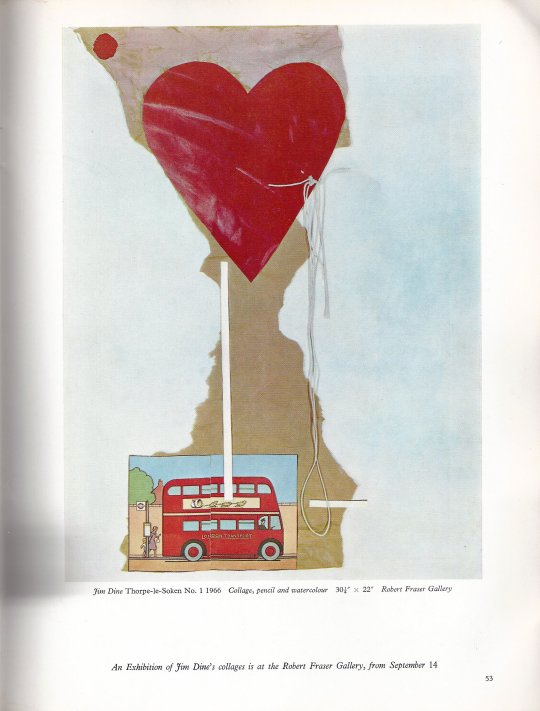
RF: But you don’t think that by the very fact of art being popular now, it brings it into a different level of communication?
JD: Oh, it does. It’s a bit more close to show business.
RF: Here I feel there’s still a very strong concept of an academic kind of an artist.
JD: Yes, and that’s a hang-up.
RF: I think traditional art, like period style, is most acceptable to the English as something which is complex and indefinable.
JD: It’s interesting too, because with all this sort of personal freedom they really don’t want to see your fly open. Whereas in American there’s not any of this personal freedom, but that’s the only way you can deal with it – with your fly open.
RF: So people really want to be comfortable about art.
JD: Titillated! It’s more like titillation. No orgasms. I like to put down information and facts very straight sometimes. I went and bought these beautiful handmade papers and I couldn’t use them, because what does it mean when you use them? You use them with a big brush and you make façades and Georgian buildings. To cut through all that I had to make these aggressive images.
RF: These drawings aren’t pornographic. They’re more anti-social?
JD: Exactly. I’ve nothing to do with pornography. They’re not sexual at all. I would say they’re rather asexual.
RF: But in this more recent series of collages, you seem to have integrated yourself into the English scene in that you’re using elements without any satirical intent.
JD: In each one I used a drawing, a little painting that Eduardo Paolozzi gave to me. I’d spent this nice day with Paolozzi and I wanted to sort of like talk about the sweetness down there at Thorpe-le-Soken.
RF: Someone can have very private reactions to things and feel the more intensive.
JD: If you have a private reaction in America, in the broad sense, you’re thought of as a spy or something. There’s no private life there. Here it’s all private. Since I’m an American I feel that I can work within the open much easier, but this situation is certainly more desirable from a personal point of view.
RF: Do you think that when you go back to the States, there will be certain changes?
JD: I have things planned that I want to do in America which I’ve planned before and they still seem right now. What I’m doing here seems just right for here. I’m interested in the fact that you, as my dealer, and I can have a discourse like this which we could not have in America, because one’s dealer in America …
RF: Has a specific realm?
JD: Yes. He isn’t someone you see in the evening. If he is then you think there’s something wrong with him.
RF: It has to be very …
JD: Tough …
RF: Interpersonal relationship.
JD: And here, if it was that, it wouldn’t interesting at all. It wouldn’t have any point.
RF: That’s due to the kind of tempo of English life. I think it’s much friendlier.
JD: Also I’ve never had a dealer who’s of my generation, which makes a difference.
RF: I feel that there’s a much tighter sort of atmosphere in New York than there was three or four years ago when I used to live there. I mean, now all the interest and activity seem to be much more concentrated on fewer artists, fewer art galleries, fewer art critics, fewer art collectors. One of the things I like about here, is that there’s a younger generation. It’s a sort of Beatle generation that has a kind of natural attitude to Dada.
JD: What do you mean by Dada?
RF: The atmosphere.
JD: Oh, I see.
RF: It seems to be completely natural to them to express themselves in that kind of way.
JD: Yes, but in America we’ve been doing it for years.
RF: But not in an artistic way.
JD: No, but people have grown up with that idea.
RF: There seems to be a kind of difference of emotional intensity here among young people. I think that it’s really the generation under 35 who are interesting here anyway. Or that has anything to say.
JD: That’s not the case in America because the generation under 35 is getting there, but then there’s this other generation of very young kids who are very corny in their rebellion, you know ‘anti’. It seems that you all go through that before here. We’ve having the first. Suddenly a generation comes up that puts everything down and that’s not terribly productive because you spend your life putting things down.
RF: But it seems to me that the youth here has a very objective viewpoint.
JD: Yes, they do. They’re quite removed. They can stand outside of it somehow. In America it’s still very self-conscious.
RF: I think Oldenburg and so on are still kind of sensational even to some sophisticated people, whereas although the non-sophisticated works is so far behind, the actual hip people seem to be much further ahead and they’re more selective. It seems to them to be completely, totally neutral and they’ve gone through the hoop.
JD: I’ve found in my short life as an artist that there’s always these sort of rare people who get it. They’re not specific, they’re not people of any particular nature but they’re always those sort who get what I’m doing or care about what I’m doing, but they certainly aren’t a group.
RF: I remember reading something that you said some time ago that in relation, particularly to your early paintings about liking the “Furlined teacup’ and that you never thought it was in any way a freak production. It was a natural thing.
JD: When I came upon that thing in the museum as an art student I wasn’t shocked you see. It only reaffirmed something, an idea what one had of, well yes, right, why not?
RF: It seems there’s a hope for a new way.
JD: I hope so. There’s got to be. We’re really hopeful, in the net 30 years of seeing a revolution in the scene, en masse. Suddenly now it’s available through communication. Look at the generation of kids who grow up with solid T.V. all the time. It’s another way of seeing. It’s not rare. It’s not even classifiable as a Surrealist thing, nor as a far out thing. It’s just part of life.
RF: So that famous gap between art and life just won’t exist any more?
JD: It doesn’t exist for me anyway. I never felt that. People always ask if you’re one of those people who bridge that gap. Well, what gap? I mean there’s art and there’s life. What does it mean?
RF: But you don’t feel that a certain school of artists in the States now seem to get around that by denying the fact of composition. That would be their way of denying the existence of art.
JD: What do you mean?
RF: Well, people like Robert Morris.
JD: Oh, I see.
RF: It’s always seemed to me that you’re particularly interested in composition.
JD: Yes, in a musical way. I really feel like a composer. Many times I feel suites of drawings are like string quartets and I think there’s a parallel. I mean just pure information …
RF: You’re interested in style?
JD: Exactly. I’m interested in style at all kinds of levels. Like today, I saw that soccer player George Cohen. There was a style you know.

7 notes
·
View notes
Photo

Zardoz, Interplanetary Wormhole Kitteh Edition
#OK...here it is without all the other posts. yer welcome#cats#kitteh#humor#lol#cat humor#zardoz#scifi classic#sean connery in a red diaper#floating magritte heads spitting guns...marvelous surreal/psychedlic piece of wtf.#it's art you bitches#art i tell you
2 notes
·
View notes
Photo










Seyo Cizmic (artist working in San Diego)
Illiteracy - rose stem, pencil lead and eraser - 17 x 1 x 1 cm - 2013
Exhaustion - redesigned hammer - 2016
Fish Machine Bank - goldfish in gumball machine
God on Our Side (two versions) - Uzi replica assault pistols with hand-carved crucifix
Love Disarmed - homage to Rene Magritte - installation view
Misfit (three variations) - modified paintbrushes with human hair
Guilt-free - birdcage and oil painting in frame
Civil War Gun - redesigned pistol replica
Harakiri (Seppuku) - redesigned hammer and nail
Misfit - modified paintbrush with human hair
“My work embodies a passionate response to the human condition: the comedies and tragedies of life and all of the wonderful experiences in between. The titles I give to my work tell a story that allows the artwork to be manipulated.
My aim is not to answer the questions; it is to raise questions and to make a commentary on aspects of our everyday life.” ~ Seyo Cizmic

https://seyocizmic.com/
37 notes
·
View notes
Text
Silence {VII}

Warnings: Language
Pairing: Vigilante!Tom Holland x reader
Word count: 3k
A/N: so it’s been a hot minute since I last updated, but I have a very good reason, which is school has been killing me. I swear to god, this semester wants me dead. this semester is an evil sea witch that wants my voice. literally. I lost my voice the week before my recital. but anyways, before I head into two weeks of non-stop papers, studying, and exams, here is an update on Silence. I hope you enjoy! please drop your theories into my inbox because I l o v e hearing them!! and as always, thank you to @harryrholland for my header and please note I DO NOT HAVE A TAGS LIST!!!!! THE REASON WHY IS IN MY FAQ!!!! ANY/ALL MESSAGES REGARDING THIS WILL BE DELETED!!!!
{masterlist}
{silence: a mixtape}
Sleep didn’t come easy to you that night. As you lay in bed, listening to the rain pour down, you replayed Tom’s words and abrupt, out of character exit over and over. You couldn’t understand what had made him react that way; was he really so offended that you didn’t like PDA at work? Why had that been such a big deal?
Whatever the answer was, it didn’t come to you. It was clear that you were exhausted when you made it to work, and you stayed hidden away inside your office for most of the day, answering emails, researching exhibits, and doing whatever you could to avoid human interaction. You instructed Felicity to keep all humans away from you that day, saying that you had important research to do, and couldn’t be disturbed. Really, you just couldn’t handle the thought of interacting with people. All you wanted to do was stay in your office, secluded, and not deal with any stress from the outside world.
However, that didn’t stop people from trying to disturb it. You could almost swear that your phone was ringing more than usual, with crisis after crisis popping up, and everyone seemed to depend on you to solve them. You felt bad for poor Felicity; you remembered what interning was like, and with the amount of work and scheduling getting pushed onto her plate, you were considering getting her an intern of her own when your phone rang again. You stared at it in distaste for a moment before answering with a sigh.
“Hello?”
“Mr. Holland is here to see you.” Felicity’s voice rang through the phone. “Shall I send him in?”
You sit up straighter in your chair. Why would Tom be here? After all, he was the one who told you to have no contact with him.
“Um, no.” You said after your moment of confusion cleared. “No, I…I’m busy. I don’t have time to talk to him.”
“Are you sure?” Felicity questioned. “He says it’s important—”
“No. Whatever it is, it’s not important.” You said flatly, remembering how he had stormed out of your apartment last night. “And please add Mr. Holland to the list of people I don’t want to take calls from anymore.”
You hung up the phone before Felicity could respond, sitting back in your chair. Why on earth was Tom calling after what he had said last night? What could be so important? He must know you had no desire to see him. Yet here he was.
Just then, there was a knock at the door, pulling you out of your thoughts. You got up with a frustrated groan, pulling the door open wide.
“Felicity, please, just tell Mr. Holland to leave before—” You cut off abruptly as you looked up into Tom’s warm and worried brown eyes.
He was dressed in his usual suit and tie, his Rolex watch and T ring visible on the hand that was pressed against the frame of your door. His curls were slicked back as they always were, save for one stray strand hanging down in front of his face, as if he were frazzled.
“Why do you want Mr. Holland to leave?” He asked in a confused voice.
You huffed at his words. “Jesus, Tom, I don’t want to do this—”
“Did I…” He cleared his throat. “I-I’m sorry—”
“You should be!” You exploded, losing your composure for a split second. Taking a calming breath, you pulled Tom into your office and shut the door behind him. “After what you did last night…Look, you know I’m not comfortable with PDA. My job is important to me, and I can’t have rumours about me dating museum donors flying around.”
“Of course.” Tom nodded quickly. “And when you said that, I…reacted poorly?”
His phrasing of the sentence made you pause. It wasn’t so much a statement, but a question. As if he couldn’t remember his exact reaction. You looked at him, confusion beginning to tinge your features as it did his.
“Yes, Tom. You reacted poorly.” You cocked your head to the side. “Do you not remember…?”
“Of course I do.” Tom grabbed your hand, pulling you closer to him. “And I sincerely apologize, darling. I was…stressed yesterday. I took it out on you. I overreacted. That wasn’t right.” He gave you his signature charming smile. “Forgive me?”
“You really…you really hurt my feelings.” You said slowly. “A quick apology won’t make that better.”
“Of course not.” Tom agreed, squeezing your hand once. “No, I…I came here with an invitation, actually. A peace offering.”
You bit your lip, hesitant but curious. “What…sort of peace offering?”
“I’d like for you to join me at my childhood home for dinner tonight.” Tom said in a confident tone. “All my brothers will be there, as will my mother…my father might even make an appearance, if work permits.”
Your head snapped up. “Your father?”
“Of course. It is his home, after all. And I am his eldest son. I want you and him to get along.” Tom tucked a strand of your hair behind your ear. “Is that alright?”
The truth was, it wasn’t alright. Something about it didn’t sit well with you. If Tom was trying to undermine his father’s business, expose his dirty dealings with Corewell, why would it matter if you got along with him? Wouldn’t he expect you not to get along with him?
Your eyes flickered to the T ring on Tom’s hand again. Something about this wasn’t adding up, but you couldn’t place your finger on what it was.
“Y/N?” Tom interrupted your thoughts, chuckling. “I’m kind of waiting on an answer here…?”
“Alright.” You agreed faintly. “I’ll…accompany you to dinner.” You cleared your throat and looked back at your desk. “I just…I have some work to finish up, alright? Will you wait?”
Tom nodded. “I can bring the car around, or—”
“Or,” You interrupted, an idea forming in your mind. “Why don’t we meet…where we first met? Do you remember where that is?”
Tom laughed. “Of course I do. I’ll never forget it.”
You nodded. “Right, so…I’ll meet you out there in a bit, alright? I’ll be quick, I promise.”
Tom pressed a quick kiss to your lips before leaving. The moment he was gone, you quickly strutted to your desk and grabbed your laptop, closing it and tucking it in your bag. The gun from the first assassin was still in your bag as well, and it clicked against the laptop. After what had happened to you in the last few days, you hadn’t felt safe leaving it at home. Once your computer was secure, you went to your filing cabinet and opened the H drawer, thumbing through the files until you reached “Holland.” You pulled out the file hastily, and tucked that in your bag as well, glancing over your shoulder as you did so. If there was something strange going on, you were certain the answer was in these files. It had to be.
You grabbed your jacket and slipped it on, slinging your bag over your shoulder. Locking your office behind you, you began to make your way to the back alley where you and Tom first met, when he was the Silence. When he saved your life. You tried to sneak out without being noticed, but you were never able to walk through the museum without someone flagging you down.
“Ms. Y/L/N!” One of the interns called out to you. “Do you have a moment to answer a question for me?”
You sighed in frustration internally, but pasted a smile onto your face. It was important to you that younger employees felt like they could rely on you. “Yes, Michael? What is it?”
“I was looking at one of the paintings in the East wing earlier, and I think one of the info cards is incorrect?” Michael said nervously. “I—I don’t mean to say you made a mistake, but—”
“It’s okay, Michael.” You laughed a bit. “I’m human. I make mistakes. Can you show me?”
Michael sighed in relief. “Yeah. Yeah, I can. Follow me.”
Michael led you down the hallways, past guests and various paintings. “It’s just up here, on the left. It’s an impressionist—”
“Y/N!” You heard Tom call you from across the room. “There you are! I’ve been waiting!”
You frowned in confusion as Tom smiled at you. Your eyes flickered between him and the painting he was standing in front of—The Lovers II by Magritte. The painting you met him and his brothers in front of at the investor’s gala.
Your suspicion that something was wrong increased. Why would Tom come here, and not the alley? This wasn’t the place you first met. Maybe he meant the place you really met him, as Tom? Somehow, you didn’t think that was true.
“Michael, I have to go.” You said quickly, pulling your bag closer to you. “Sorry, I—go find Angie, alright? She’ll be able to check that for you.”
You quickly made your way to Tom. He smiled and pressed a kiss to your cheek once you reached him.
“Here, love, let me take that for you.” He tried to grab your work bag from you, but you kept a hand on it.
“N-no!” You said urgently. Tom gave you a strange look at your reaction, and you laughed it off, albeit nervously. “It’s—it’s alright, Tom. Don’t worry.”
���Well, alright. But if someone tells me I’m not being a gentleman, I’m blaming you.” He laughed, taking your hand. “Come, darling. The car is waiting.”
The entire drive to Tom’s family home, you were anxious. You couldn’t stop feeling like something was off, but you couldn’t quite put your finger on what. You felt like you were missing the bigger picture, and you weren’t used to it. You hated it.
When Tom pulled into the driveway of his home (which was huge, of course. It was expected), he turned the car off and turned to you. “Alright, darling. What’s wrong? Are you really so scared to meet my family?”
“A-a little.” You said, taking the excuse. “I just…don’t understand why it’s important for me to meet your father. Isn’t he…evil? He’s working with Corewell—”
“My father isn’t evil.” Tom cut across you, his voice sharp. “He’s a good man. And he’s done a lot for me.”
“I’m sorry.” You said hastily. Tom immediately looked closed off. “I didn’t mean to—”
“It’s fine.” Tom cleared his throat. “Just…come on. Come inside.”
Despite your reservations, you followed his instructions, allowing Tom to take your hand and lead you inside the house.
He opened the large double doors with ease, and your eyes widened as you took in the interior of the house. It almost seemed like a modern Versailles inside, with large pillars and marble floors. There was so much art on the walls it made your art historian heart skip a beat. You could pick out a few different famous artists from just a quick glance, and despite your reservations about art by such iconic artists being kept privately, you were impressed.
Your heels clicked against the shiny floor as Tom led you towards a grand staircase, two steps ahead of you. He began walking you up the steps, and you looked up at him in confusion.
“Tom, where are we—”
“Thomas!” A voice called from the bottom of the stairs. “Who is this?”
You turned around and saw a middle aged man in a suit waiting at the bottom of the stairs. Glasses were perched on his face, and despite his unassuming appearance, Tom paused, his shoulders tensing at the voice. “Father.” Tom turned around, a smile forming on his face. “Hello.”
“Who is this?” Tom’s father repeated as you began walking down the stairs. “You know it’s proper to introduce your company to your parents.”
“Right.” Tom cleared his throat. “Father, this is Y/N Y/L/N, the assistant curator at the MoMA. Y/N, this is my father, Dominic Holland.”
You swallowed hard, extending a hand out to him. “Hello, sir. It’s nice to meet you.”
“Ms. Y/L/N.” Dominic shook your hand. His touch was cold, and his handshake hard. “I’ve heard…so much about you. The pleasure is all mine.”
Something about his greeting unnerved you. Maybe it was because you knew how he really made his money, but it felt as if it was more than that. It felt like, as much as you knew about him…he knew as much about you. That made you uneasy.
You just smiled again, trying to hide your feelings. Tom cleared his throat again.
“Y/N will be joining us for dinner, Father.” Tom said, looking down. Around his family, his demeanor changed than from what you knew. “But first…may I have a word with you about business?”
Dominic glanced at you again but nodded. “Of course. Let’s head to my office.”
Tom leaned down and kissed your cheek, but it felt so much colder than it ever has before. “Why don’t you head to my old bedroom, hm? I’ll meet you there. Just wait for me, alright?”
Your smile faded. “Wait for you?”
“Yeah. Just wait.” Tom walked past you to his father and walked off with him.
You watched as they disappeared around the corner of the stairs. What could they need to discuss? You pulled your bag tight against you, so aware of the information that was inside it. For some reason, you knew that you needed to keep your bag tight to you all night.
Still, you walked up the stairs and down the hallway, searching for Tom’s childhood bedroom. As you walked, you realized that for all the priceless art all over the wall, there was not one photo of Tom, the twins, or Paddy, let alone William. Why would there be no photos of the child who went missing? The longer you were in the Holland house, the more you felt like you were walking into some sort of elaborate set up. Everything was too perfect. Like it had been carefully manipulated to look that way.
At the end of the flawlessly decorated—and flawlessly cold—hallway, you found two doors parallel to each other. Both doors were monogrammed, the one to the left with a W and the one to the right with a T. Your hand reached for the door with a W first, but paused just before touching the handle. Walking into the bedroom of a dead teenager…you felt like that would be crossing a line. Instead, you turned around and opened Tom’s bedroom door.
As you walked in, you were struck with the same impression that the rest of the house gave you. Everything was immaculately decorated, expensive looking, and without any rough touches. It was heartless. There was nothing in here that gave any personality. There was no hint of Tom in the grey bedspread or curtains hanging around the four poster bed. There wasn’t even a speck of dust on the desk. It was like the bedroom hadn’t been lived in, like it was just a showroom model in a furniture store.
You sat down on the bed, almost frightened to crease the sheets. You had no idea how Tom could’ve bore growing up in a house that was built like a museum. Granted, he was away at boarding school a lot, but home should be home. Not a catalogue picture.
As you looked around the room, you noticed one difference in Tom’s bedroom from the rest of the house. Sitting on his bedside table was a picture of him and William. Judging from all the photos of William that you’d found online and in news articles, the picture was taken close to the time he disappeared.
You picked up the picture frame, smiling to yourself. Tom and William had their arms around each other’s shoulders, and they were both wearing jerseys with their boarding school’s crest in on the shoulder. Their foreheads were sweaty, and their curls messy. You guessed the photo was taken after one of their soccer games.
But the longer you looked at it, the more something about the photo, like the rest of the house, seemed off. You lifted the photo closer to your face, examining its every detail. What was it? What was strange?
Finally, you found the needle in the proverbial haystack. In the photo, neither Tom nor William had a scar at the top right corner of their lips. When you pulled the mask off Tom, right before you kissed him for the first time, you noticed the scar. Because there was no scar in the photo, it meant he got it after the photo was taken. That wasn’t what alarmed you.
What alarmed you was that you finally realized why you always thought Tom looked different when you didn’t see him as the Silence. It wasn’t because of his aura, or his attitude, or his clothes. What made him look different was the lack of a scar on his lip. A small detail, easy to miss when you weren’t looking for it. But now? It seemed so obvious. Someone was lying to you. Someone wasn’t who they said they were.
You thought back to your fight with Tom, how he appeared to have no memory of it the next day, the words he said to you before he left your apartment.
“I’m not Tom. I never was. Not really.”
You dropped the photo onto the floor, the glass shattering as the frame hit the ground. Your hand went to your mouth as your mind raced, and you grabbed your bag, reaching to pull out the Holland file. Before you could grab it, however, you heard a noise outside. You ran to the door and locked it before turning back to the bed. But the noise didn’t disappear.
The knock came again, and with a shudder, you turned back to the only other place it could be coming from. The window.
And you saw the masked face of the Silence staring back at you.
{part VIII}
#tom holland#tom holland x reader#tom holland x y/n#tom holland x you#tom holland fanficti#tom holland fic#tom holland imagine#peter parker#peter parker x y/n#peter parker x you#peter parker x reader#peter parker fanfiction#peter parker fic#peter parker imagine#spider-man#spider man x reader#spider man x y/n#spider man x you#spider man fanfiction#spider man fic#spider man imagines#marvel imagine#marvel fanfiction#avengers imagines#avenger fanfiction#avengers fic#marvel fic#spider man: homecoming#spider man: far from home#writing
425 notes
·
View notes
Text
Peephole | Five
word count: 1,515
warnings: lowkey sexual tension, swearing
a/n: enjoy this quick update! i may not be able to write for a few days because my finals are this week and i have a huge thesis due, so enjoy this early gift~
Life often imitated art, at least that’s what you believed as you perused the local gallery. Houses in the middle of oceans, staircases made of 88 ivory and ebony keys, disembodied heads, all painted in muted colors, highlighting the dismal world of Surrealism. You viewed the world similarly to the likes of Breton, Magritte, and Dalí: strange and beyond rational explanation. Perhaps that was the reason why you were with Jimin in the first place, how you overlooked his murderous side. In your mind, none of it was real, just bizarre fantasies and delusions.
Gazing around the small venue, you scanned the crowd for Jimin. He was sat on a bench, wistfully staring at a painting, unmoving, unblinking— and Gods, did he look beautiful. While you looked and felt fragmented, like a Surrealist Exquisite Corpse, Jimin appeared as if he could have delicately crafted from the hands of Pre-Raphaelites. Every ounce of him held poise, from the soles of his feet to his rosy, cherubic cheeks. Seemingly captivated by his ethereal beauty, you joined him on the bench, studying the painting that enthralled him. An optical illusion of a skull, its bony structure comprised of various weapons. Knives, guns, hammers, brass knuckles, instruments of violence, torturing devices. Any other sane person would look at the painting, mumble ‘aha!’ as they contemplated the meaning before moving on, but Jimin was utterly transfixed, borderline obsessed with the painting.
You kept your voice low, barely above a whisper, “Jimin?” Although his gaze was still fixed beyond him, towards the painting, he replied with a noncommittal hum. His response, or lack thereof, bothered you, so you pressed him again. “Jimin?”
“Hmm? What is it, jagiya?”
“Why?”
Apparently, your gentle nagging was enough to recapture his attention, his mahogany eyes now focusing on you. Ringed fingers curled around your cheeks, affectionately cradling your face in his hands. “Why do I call you jagiya? Because you’re my girlfriend and I really li–”
“That’s not what I mean. Why do you do it,” you mumbled, eyes downcast. “How can you do it?” It pained you to ask about his heinous side, especially knowing just how quickly Lee Jimin could end your life. But in all honesty, after witnessing his remorseless brutality without the protective barrier of your peephole, you craved to dig deeper into is psyche. After a scarce few seconds, as if he were testing himself and his patience, Jimin relinquished his hold on your face, his hands dropping to his lap. “You know,” he said, focus returning to the macabre skull, “I think I should be the one asking you, Y/N. Why are you alive?” You blinked, caught off guard by his rebuttal, hoping you had just misunderstood. “Wh-What?”
“It’s difficult to answer the question ‘Why do you kill?’ just as it is to answer the question, ‘Why are you alive?’ It’s simple: to live is to kill.” Flabbergasted by Jimin’s response, you found yourself speechless. His attitude had not changed, he was still the lively, warm Jimin, whose voice was full of mirth. But the words which he spoke were detached from his persona— full of indifference. “Human nature is inherently violent,” Jimin began, hands laced together in his lap idly, “But whether we act upon that or not is up to us. Like a praying mantis who decapitates her mate after sex, I target those who I see as weak— vulnerable. And I just do it, like it’s a natural instinct. There’s no reason why I have these impulses, other than I just do. But unlike those weaklings who might kill in self-defense or for self-preservation, I don’t feel any remorse.” Jimin pauses, drawing in a shaky breath as a small tent forms in his slacks. “Only complete serendipity. Like as if I were on cloud nine.” Unclasping his left hand, he carded through his hair to relieve the itching, murderous, delicious tension that riled him up. “Plus,” Jimin paused, “My rule is that I only kill those that deserve it. Criminals, rapists, scum of the Earth.”
“So that woman from earlier–”
“She was embezzling money from Hoseok, the studio owner, and I just happened to catch her red-handed,” Jimin explained, laughing at his own morbid joke. Instantly, you perked up, now more intrigued. “So you’re basically a vigilante then?”
With a scoff, Jimin shook his head, “You’re too naïve, Y/N. I’m not a good person, not in the slightest.” Cocking an eyebrow, you waited for clarification, while Jimin returned his focus to the painting on the wall. “I kill lowlifes because it makes it less suspicious. If I were to take an innocent woman off the street and mutilate her beyond identification, all of Seoul would be on the lookout for a serial killer. But if I end the life of a convict who had previously assaulted three women, no one would bat a fucking eye.”
Without warning, Jimin abruptly stood and stretched, a sliver of his abdomen peeking out from under his dress shirt. “Let’s go check out the next exhibit,” he said, offering you a hand while changing conversational topics expertly. You silently accepted both alternatives, mindlessly trailing behind the blonde as he led you to a less populated section of the quaint museum, one that mainly focused on sculptures and pottery. It baffled you— how could someone as considerate and wholesome as Lee Jimin find satisfaction in plunging a blade into another human being? You struggled to wrap your head around his philosophical justification behind his murderous tendencies. Jimin made killing seem simple, easy, understandable, which made him all the more frightening.
“Jimin, I just,” you faltered, unsure of how to proceed, “I don’t really get why it is that you kill, but you should really stop.” The dancer’s eyebrows furrowed in irritation, visibly annoyed by your declaration. “I just… Don’t want you to get caught by the police.” Jimin immediately called your bluff, a coy smile twitching at the corner of his lips. With a breathy laugh, Jimin strode past you and towards a sculpture, it’s weathered marble now a dull, aged yellow. Back turned to you, he spoke without a care for confidentiality, “What is better: a virgin who kills, or a bastard that doesn’t?” Your eyes widened in shock, the small room suddenly feeling like a sweltering desert as heat traveled to your face. Swallowing thickly, you attempted to ward off the blush that tinted your cheeks, “I-I don’t see how that’s relevant.”
The blonde turned around, umber eyes sparkling with raw, unbridled lust. “I’m a virgin, you know,” he giggled while winking flirtatiously, only flustering you further. “I was always waiting for the right person, the one who would accept me. All of me.”
•·················•·················•
Being in a relationship with Lee Jimin taught you a lot of things. For one, he mainly preferred sour foods and had a distaste for mangoes. You also learned that he wore contacts due to poor eyesight, but only donned his thick-framed glasses for night-time reading. Most importantly, Jimin never verbalized when he was bringing home the next kill— he simply sent you a text message with a time. Those texts were his own way of asking you to accept him.
Accept him as a boyfriend.
A lover.
A murderer.
When you watched Jimin from your side of the peephole, it was as if you were watching a movie starring the blonde bombshell next door. You paid little mind to the blood and gore, each occurrence leaving you more desensitized than the next. And after each session, Jimin would come over and make you dinner, chatting idly about your day or his latest choreography. Every night after he would retire to his neighboring room, you would lie awake and curse your initial impulse to look through the peephole. You were a pervert, and this was your punishment.
Fatigued, as usual, you began your morning routine, or lack thereof. While the daytime consisted of you browsing the internet and participating in paid surveys as a form of income, it was sporadic at best. Most of the time, you would stare at the ceiling in a stupor, waiting for the inevitable arrival of Lee Jimin. Today, though, deviated from its usual lackadaisical schedule. The ringing of your doorbell drew your attention away from your cellphone’s screen, the arrival of an uninvited guest urging you to rise from your sheets. Sliding into house slippers, you trudged across the room and into the threshold, unlocking the deadbolt, but not the security chain. Peeking through the sliver of open door, you were surprised to see a well-dressed man sporting a brown blazer and charcoal turtleneck, his black hair coiffed into a lazy pompadour. He was scribbling something into a small notebook, the pen furiously scratching against the tiny sheet of paper. Noticing your presence, the man flashed a dimpled smile and introduced himself before procuring a badge that was concealed behind his lapel.
“Good morning, Miss Y/N. My name is Detective Kim Namjoon, from the Seoul metropolitan police. May I ask you a few questions concerning your next-door neighbor Lee Jimin?”
prev | next
#bts yandere#bts yandere au#park jimin yandere#park jimin yandere au#jimin yandere#jimin yandere au#jimin serial killer#jimin serial killer au#park jimin serial killer#park jimin serial killer au
210 notes
·
View notes
Text
The Harvest

This is me handing you the knife/
This is you fronting like you don’t want it/
Pero tabien papito/ I still love you/
in dirty desperation/ like the Mexicanas
do in novelas/ This is how we Nuyoricans
make love/ with cigarette breaths/metro card
swipes/ and Trump stained matresses/
Here Cabron, this is the knife you use to peel/
the zing off of oranges/ the skin off
of pendejas like me who write poems/
and fuck/ instead of treating sadness/
with gun toting PHD holders/
Here/ take this knife/
peel off my skin/
harvest my organs/
Because I know you/
better than/
you know
yourself.
Written by: Maria Billini
(All rights reserved by Maria Billini and vidaandthecity)
Image: Art by René Magritte
2 notes
·
View notes
Text
Yugioh S2 Ep 18: Marik, a Self Proclaimed Card Expert, Mills Himself to Death
I’ve been a little under the weather, so I was like “I’ll hold off on the Yugioh post for a bit” which was a good choice because this was mostly a non-stop rant about art twitter.
I am so glad I deleted all 50000 words about Magritte. Y’all I got HEATED about Magritte when I caught a weird bug this weekend. I even started talking about ceramic funk. You would have loved it.
Anywhere, where were we? Oh yeah, Yugi has decided to stop crying into the pavement.

Yugi’s feeling much better, thanks to Kaiba telling him that he doesn’t deserve any of the nice things that has ever happened to him. Just like what my sophomore year animation professor used to tell us every day as we cried into our light tables.
(Also, that same guy listened to Numa-numa unironically and I’ve never understood it. It keeps me up at night. Why was was my professor listening to Numa-numa yeaaars after it was stale, and why did he say “guys I found this great song, listen to it. I like to blast it when I’m speeding down the freeway” and how did he not know this was a meme? It was the first meme ever made how did he now KNOW? Who gave that horrible 40 yo man Numa-Numa!? I will never know, and it will be the last thought I have before my soul leaves this mortal plane. Damn you, Professor Kelly.)

(read more under the cut)
The Kaibas are watching Yugi play and are making a pretty choice face in reaction to all the sweet Yugi brand of Hell that is going on here. Especially Mokuba.

It is about this moment that Marik’s plan is thrown asunder. He has set up a deck that lets him draw a ton of cards, since every card in his hand makes his dragon stronger. In theory it’s like ya, make it as strong as possible--but, he decides to put a monster on the field that can do an infinite card draw combo if Pharaoh mind-controls it.
When you’re up against the Pharaoh who is all about mind-crushing and you don’t check his deck beforehand to see if he has the mind-control card? Marik.
Marik please.
Anyways Marik then mills himself to death on like turn 5. I have a soft spot for mill decks, so Congrats, Marik, that was the funniest, stupidest way to die in a card game on this show so far, other than that time that Kaiba’s corpse’s dragon inexplicably self-destructed, you hold the trophy now for stupidest card game loss.

And Mokuba, who’s job as Battle City Commissioner is still sort of...undefined? Decides his job is to hurry down there and like personally interview the creepiest person who has ever stepped foot on this show.


Mokuba and his complete lack of being able to sense danger. I guess that’s what happens when your brother is one step away from turning into a Gotham Villain. JK, Kaiba is about 3 steps past Gotham villain, and the only reason the bodies aren’t dropping around Kaiba is because he doesn’t have the right card to do that yet.

Anyway, Kaiba and Pharaoh have this rivalry going on that makes sense because of their history but like they go to the same school amiright? Like they can just duel during lunchbreak? Why does it have to be a huge thing between these two every single time?
I mean I know the answer is because this is an anime, but these two are acting like they are going to duel with guns at high noon.

Not like it matters because Marik has to constantly remind me that he’s the main villain of this show because whenever he’s not on screen I immediately forget.
There are so many villains on this show.





I only just now realized this guys’ super scene purple-gray lipstick. Whenever I see purple lipstick IRL (which is not often obviously) it always makes me wonder, did they buy it like that from Mac or is it maaaybe DIY? What I’m saying is, I see this purple shade and I’m like I wonder if Marik got bored on that boat and did that crayon-to-lipstick pinterest tutorial (which I of course have never tried)? My bet is bored on the boat. That lavender lipstick is like 30 bucks, can’t buy purple at target.
But RIP, lavender lipstick.

He put so much effort into that smokey eye and now it’s all smudged.

This would have ended the season. If either Kaiba or Yugi got knocked out of the competition right now. Boom--the prophecy can’t happen. But, WTV.


Ah and now our hero and our villain start a commuting race. Who will get there first, the guy in a boat that hasn’t yet pulled into harbor, or the guy on foot who has the cell phone number of all these kids that are in danger right now.


I mean I guess you can take your time, Marik. Yugi will have to turn right around to pick up those holograms that he left all over the park back there.
So, next week, on Yugioh,
Does Joey even duel someone or is he too busy buying a sandwich? What shape will Joey’s guyliner be once he gets possessed? So did Kaiba overhear that all of Yugi’s friends will absolutely get possessed and just say “well I better fly away on my helicopter, have fun running off with your two legs”?
If you just got here, this is a link to read all these Yugioh recaps in chrono order from S1 Ep1.
#yugioh#yugioh recap#s2 ep18#yugi muto#seto kaiba#mokuba#the quiet one#marik ishtar#a motorcycle happens for some reason#also a boat#lots of random vehicles in this show youknow#got to give them credit#those vehicles are hell to draw
30 notes
·
View notes
Text
Red Velvet’s Bad Boy MV (Music Video Analysis)

The views presented in this theory are a part of my own individual interpretation of the video, which means they are subject to error. Lyrics taken from kpopviral.
The Treachery of Images: I’ve just posted an analysis for Peek-A-Boo, which deals heavily on the inversion of male fantasy. The theme carries over into this video. Though the title is “Bad Boy,” no boys are present. The focus on the video is entirely femininity, which makes sense when taking into consideration that the term “bad boy” is almost always defined in opposition to the “good girl.” Take Grease for example. Sandy is a good girl who has met a bad boy, and the film concludes with her transformation over into a bad girl. In this dichotomous presentation of femininity (meaning girls are only either innocent or corrupted), the bad boy is the means by which the girl is transformed. Good girls are seduced by bad boys, and ruined.
Here, however, Red Velvet has more agency than that. The lyrics address the bad boy in question as they attempt to seduce him.
You must be confused, you can’t even imagine
You can try to get away but there’s no room at all
The answer’s decided, you follow me naturally
I choose you, I already chose you
Though they play out both the roles of the “innocent” and the “corrupted” they ultimately seek to destroy the constraints these images place upon them.

As the video opens, the members sit in an empty hot tub while wearing school girl uniforms. The uniforms are typical of representations of young girls, both used to show innocence and eroticism, so we are introduced early to the dichotomy at hand. The image of the hot tub, as well, is suggestive, though empty. The voyeurism of girls (even clothed) in a hot tub is disrupted by the falling snow, and the book.


The theme of voyeurism is present throughout the video, especially as the camera essentially “intrudes” upon the private setting of Joy and Seulgi in bed, confiding in one another. These voyeuristic and homoerotic elements play into the male fantasy of what happens at sleepovers, acted out by the camera.
Like with the snow, this image is interrupted by the inclusion of the book.


The book cover reads “Ceci n’est pas de la levre,” mimicking Rene Magritte’s famous painting The Treachery of Images. The text translates to “this is not a pipe,” which appears paradoxical at first. However, it is not a pipe, but the image of one. Though the book’s French is not correct, it should say something along the lines of “these are not lips.” What it stamped on the cover are not lips, but the image of lips.
The treachery of images is that we forget they are images. We believe them so wholly that we take representation as truth. This theme is central to the understanding of the video. We must remember what we are seeing isn’t trustworthy: it’s just an image. This is so brilliantly put in terms of femininity with lipstick rather than the male-coded pipe.
What we see throughout the video are not true images of femininity, but constructed images and conceptions. This can extend beyond the theme of femininity I’ve focused on, to just the simple image of being in the public eye. An “idol image” is not a complete and full person, though people often make this mistake.

Here we come upon one of the main settings of the video. A red bed sits in the middle of a road in an icy place. Four of the members lie in bed. (I think Joy is missing, but there’s no reason I can think of why Joy specifically would be missing, so I’m going to assume it’s not important.)
This scene presents a set of contradictions. The setting is cold, while the bed is a symbol of rest and comfort. There’s a suit case, and a street, which imply movement and temporary stasis, but the bed, again, implies permanence. Cold versus comfort, temporariness versus permanence in this dream-like setting communicate their conflicted emotions concerning the images rendered of them. They are uncomfortable and comfortable at once, tempted both to stay and to leave.
The girls sleeping in the bed, again, tie into a voyeuristic theme. Their unconscious state makes them vulnerable, as if they are unaware of the camera and lack the agency to break free of the watchful gaze of the camera.

In black and white, suggested to be on a different time line than my previous screenshot, Seulgi walks toward the bed alone with a suit case in hand. This symbolizes her entrance into this isolated and emotional landscape. The suitcase indicates her intention to stay, at least for a while, before the eventual decision to leave.
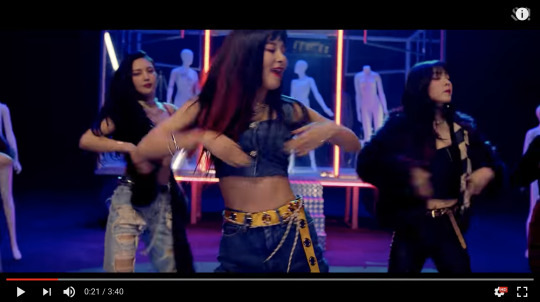
Much of the video takes place in this setting. The girls are dressed in stark contrast to their earlier sleep over attire. Where that was the image of innocence and soft femininity, here they display something closer to the “bad girl” image.
This setting is also decorated with female mannequins. They are approximations of the female form (a representation and not a truth), and they are idealized and commercialized objects meant to sell clothing. These mannequins represent the battle of representational and true female identity--they present an ideal body but are not an actual body. Where women are often made over into idealized, commercialized objects (typical in the k-pop industry especially), we must remember that the image of such women are only images, and that people exist behind them.
Additionally, though I haven’t captured this in the screenshot, the platform on the back is on wheels, again suggestive of impermanence.
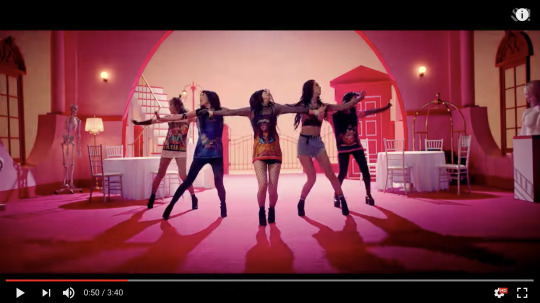
This is the third key setting of the video. With tables and a staircase and a front door, the room appears at first to be a home. However, there is a luggage cart in the corner, revealing the potential domestic setting to be a hotel lobby. The hotel carries on the theme of impermanence, and ties back to the suitcase Seulgi carries.

Here Yeri displays the sleep over image of soft femininity.

She presses the typewriter key and the screen ripples.
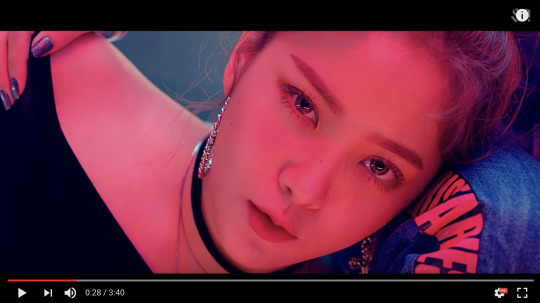
She falls into this “bad girl” image--the transformation complete in one moment. She is the innocent made corrupted at the press of a key.
Throughout the video, the girls whisper in each other’s ears. They confide in one another, but we do not hear what is said. The camera (often pictured in this video as a polaroid) captures images and is unconcerned with the things they say. The image of femininity is unconcerned with actual thoughts and speech of women--they can speak and confide in each other in private circles, but they are not meant for public speech. Yeri’s utilization of the typewriter implies an attempt at language, at communication, which amounts to the act of rebellion. The desire to be heard is the “corrupting” force.

The members sit around a table in the hotel setting. They have the books on plates, and they read the books despite the blank pages. As will be seen a few screenshots later, the only book with text in it is the book with the lips on the cover. The reading of the blank books signifies the expectation to swallow empty ideas because they are presented in a convincing light. The books are physical, real, and from the opposite side you can believe they contain knowledge, though the inside is blank. These books give the image of knowledge without knowledge.
Only the book in Wendy’s hands is effective. The other books still read “this is not a lip” on the cover, and this statement can be taken literally. True, there are no lips on the cover. The paradox doesn’t work here. Only paired with the image of the lip can the book call attention to the treachery of images and communicate true understanding and knowledge.

The five of them walk with destructive items in their hands--bats, spray paint, etc. We see these items appear throughout the video. Keep in mind for later


Wendy, having possessed the book that called attention to the treachery of images, has a camera placed before her. She burns it, destroying the thing capable of capturing images. In the destruction, she alerts the others of the problem with the structured images, as Seulgi and Joy are entranced and fan the flames.

Despite burning the camera, the images remain, as five polaroids are tucked into the book. One for each member, these polaroids represent the conceptions and images that surround them. Though they have destroyed the camera, there is a certain sentimentality in saving the images--they’ve grown attached to them. They hide them away for safe keeping in the very book that condemns their treachery. They know the danger of the image, but it is not entirely constrictive. It’s familiar, just as the bed is comforting, just as they might be tempted to stay. This is another instance of the struggle of whether to break free from the image or not.



The girls begin to destroy both the mannequin and the hotel setting. This destruction, especially through vandalistic means such as graffiti, is a “bad girl” action. At first, the destruction appears simply rebellious and typical of the personas they embody.
Additionally, Wendy knocks the camera out, sending it spinning. This calls attention to the fact that we are watching the video through the lens of a camera. The things we are seeing are mere representational images.
The mannequins, as well, have been knocked over, and all they represent as been displaced.

Irene covers Yeri’s ears in the approximation of hear no evil. The eldest protects the youngest. This reflects the fear of influencing young girls, a fear that reveals the belief in their inherent corruptibility.
Fun fact: they used to think women were so impressionable that if they looked at something bad while pregnant, it could lead to a deformity in the child.
The assumption of being so easily influenced supposes they lack the agency to interpret the information they hear correctly.

Seulgi stands in the black and white bed setting, aiming gun at seemingly no one.

As Wendy burned the camera, she now holds a lighter.


Seulgi squirts strawberry syrup onto a white cake and the stuff drips over the sides. On first glance, it looks like blood, which is a purposeful mislead. It’s hard to catch the edge fo the bottle in Seulgi’s hand. We are supposed to think it’s blood when it is nothing more than syrup.
Unlike in Peek-A-Boo where we see violence practiced, Yeri shooting the crossbow and cutting the boy’s cheek, Irene slicing Seulgi’s cheek, all of the violence in this video is sublimated. Seulgi points a gun but it’s at no one and she never pulls the trigger. We see the shocking image of blood and it’s revealed to be nothing more than syrup. Irene poses with bolt cutters, but we never see them used. We see Irene and Yeri posing with spray cans, but the destruction is in the background already performed. Later, when the room burns, we only catch a glimpse at the flames. The destruction and violence are shown in glimpses and never in full--subverted.
This plays into the treachery of images, how little we see and do not see, and how much we can assume with just the glimpse of a thing.

Seulgi stands on the table, blowing fake money. The fake money is the illusion of luxury and not the thing itself. Though she dispenses it, none of the girls reach for it. Later, they stand under it in marvel, as it were falling snow, but they do not collect it. They understand it is worthless.

Wendy sleeps with her head down. Behind her, a member passes by while a shadow hand reaches out. A second later, Wendy’s eyes open. This connects to the sublimated violence, being unaware and stalked. It also calls attention to the theme of sleeping and waking-what happens while you sleep and what is necessary to wake to awareness.

Earlier, Seulgi had the gun pointed at no one. I think it’s necessary to point out that Seulgi very clearly has the gun pointed at the viewer, at the camera. She has aimed her gun toward the constructed image.

Where they were asleep previously, the girls sit up in bed and they seem aware of the snow for the first time. Their agency is expanding.


Here, more voyeuristic and posed images of homoeroticism play out. Irene and Joy are frozen in a near kiss. They coyly whisper in one another’s ears. This is not a natural closeness. Yeri and Seulgi look knowingly into the camera, calling attention to the fact that this is for the benefit of the camera.

Seulgi picks up the suitcase and leaves.

The bed in this setting, an object of permanence, is replaced by a car. It’s an object of agency, giving them the ability to come and go as they please.


Wendy tosses her lighter, and the place goes up in flames. The setting indicative of their bad girl image is destroyed.
They demonstrate the agency to come and go, to preserve and to destroy.

The video ends as the girls open their eyes, staring up at the camera while still dressed as innocents. In the end, they present their own individual identities, unified by the innocence of the sleep over setting and the graffiti on the floor. Though they perform the destructive act, which is a “bad girl” thing, they end the video in complete awareness and in the state of innocence, navigating between the two roles in the suggestion of unity. They are capable of both goodness and individual will. The act of destruction was not simply vandalism typical of one role, but the expression of will and individuality. They destroy the image that would divide female identity in half. They can destroy and preserve and be good. They can be awake and aware and innocent. They aren’t good girls gone bad, they’re simply girls capable of complexity and agency.
#red velvet#bad boy#the perfect red velvet#kpop#wendy#irene#yeri#joy#seulgi#analysis#SM entertainment#kpop theory#comeback
155 notes
·
View notes
Text
three from Aleathia Drehmer
Rene Magritte
Empire of Lights, 1949
The street lamp
buzzed on
like a cold, robotic
lightning beetle.
It reminds me
of our youth—
the one where
you promised me
a love that would grow
out of darkness
and fly effortlessly
heaven-bound, raining
down as sparks
of independence.
But here I stand,
on the cobbled street
outside your childhood home
watching the sky fade
behind, the trees dissolving
the edges of history
and reality with one
swipe of its sword
thinking of that innocent night.
Your bedroom window
is alight, but you’ve since
gone to other worlds. You
who promised me warmth,
eternity and hope.
I’m left with air passing
over my bare palms
hanging limply beside
the husk of my body.
I cannot even be
your memory.
his is My Waterloo
Words fly back and forth
in a coup attempt
No guns
No knives
No missiles
No atomic bombs
No ninjas
No espionage
Just words
and then radio silence
My heart says
take no prisoners
It's better that way.
The Arsonist
After all the dust
has settled,
I begin to learn
just how good
you are
at burning bridges.
Aleathia Drehmer is the editor of Durable Goods. She has recently published poems in Rusty Truck, Spillwords, Piker Press, Anti-Heroin Chic, and Cajun Mutt Press. Her first full-length collection Looking for Wild Things (Impspired) is due out later this year. www.aleathiadrehmer.com
0 notes
Text
2. "Thanks, I'll pass. I'd just go wild."
CALL ME MAÑANA - "And then we might go wild together, which sounds fun. But I guess I have a strike to watch."
"So, anything else you wanted to discuss, boiadeiro?"
5. "Good talking to you. Gotta run." [Leave.]
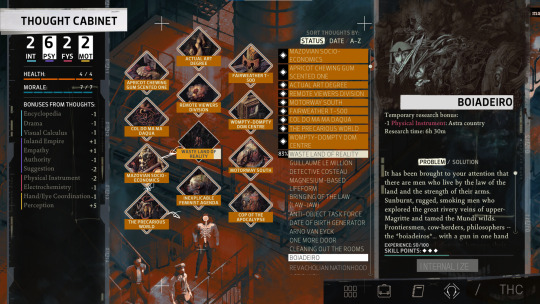
BOIADEIRO
Research time: 6h 30m
Temporary research bonus: -1 Physical Instrument: Astra country
It has been brought to your attention that there are men who live by the law of the land and the strength of their arms. Sunburnt, rugged, smoking men who explored the great rivery veins of upper-Magritte and tamed the Mundi wilds. Frontiersmen, cow-herders, philosophers -- the *boiadeiros*... with a gun in one hand and an unfiltered cigarette between their lips, these men made their own rules. What would it take for you to become one too?
🎵 Martinaise, Terminal B
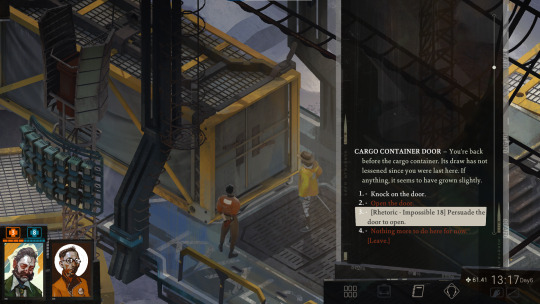
CARGO CONTAINER DOOR - You're back before the cargo container. Its draw has not lessened since you were last here. If anything, it seems to have grown slightly.
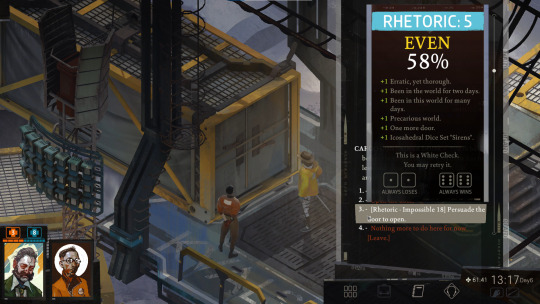
3. [Rhetoric - Impossible 18] Persuade the door to open.
+1 Erratic, yet thorough.
+1 Been in the world for two days.
+1 Been in this world for many days.
+1 Precarious world.
+1 One more door.
+1 Icosahedral Dice Set "Sirens"
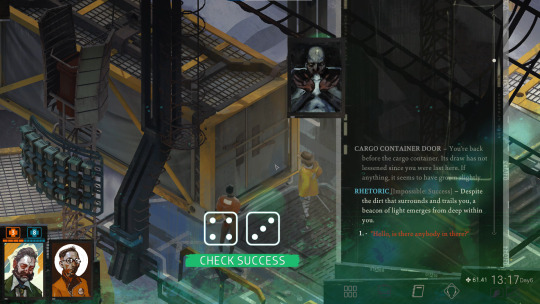
RHETORIC [Impossible: Success] - Despite the dirt that surrounds and trails you, a beacon of light emerges from deep within you.
"Hello, is there anybody in there?"
CARGO CONTAINER DOOR - The door stands silent.
KIM KITSURAGI - "Satisfied, detective?" A wry smile crosses the lieutenant's face.
RHETORIC - Try again.
"If there's someone in there, I'd like to talk to you."
CARGO CONTAINER DOOR - Just like that, you hear a click. Then a rattle. Some mechanism unlocks itself inside the door.
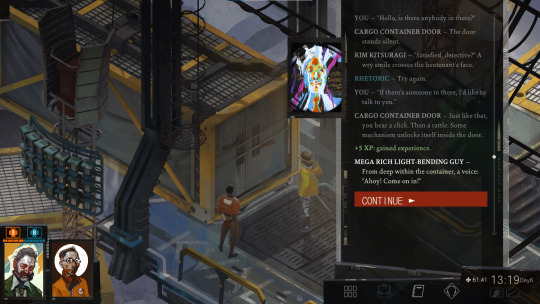
MEGA RICH LIGHT-BENDING GUY - From deep within the container, a voice: "Ahoy! Come on in!"
+5 XP
KIM KITSURAGI - The smile disappears. "You can't be serious."
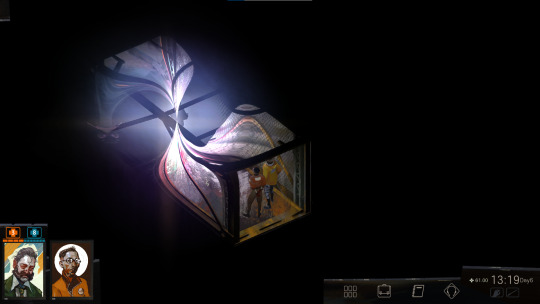
As we approach the centre of the container.... the amount of real we have increases?
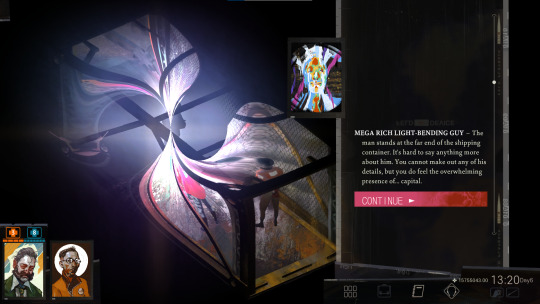
MEGA RICH LIGHT-BENDING GUY - The man stands at the far end of the shipping container. It's hard to say anything more about him. You cannot make out any of his details, but you do feel the overwhelming presence of... capital.
PHYSICAL INSTRUMENT [Trivial: Success] - The feeling causes all the hairs on your body to stand at attention like soldiers preparing for review.
Squint.
Cover your eyes…
MEGA RICH LIGHT-BENDING GUY - Something's amiss. The light beams bend around his face and scatter in a thousand directions. It seems the laws of physics do not apply here. They are suspended, distorted, an echo.
VISUAL CALCULUS [Impossible: Failure] - Trying to visualize the physics at play is liable to give you an aneurysm. Don't think about it too hard!
MEGA RICH LIGHT-BENDING GUY - In the general stillness, only your tongue moves, flickering as you utter...
"Hello!"
"What's going on in here?"
"Wow."
MEGA RICH LIGHT-BENDING GUY - "Welcome, welcome! Not too much, actually, just pleasantly surprised to have company today."
PERCEPTION (HEARING) [Trivial: Success] - You can't *hear* him, exactly, yet you're able to understand every word he says. It is very strange. An overwhelming hum covers everything -- voice doesn't escape from him.
MEGA RICH LIGHT-BENDING GUY - "Now." He claps his hands together. "What can I do for you gentlemen?" What you can see of his body appears composed. In a sharp summer suit. And yacht shoes.
"Who are you?"
"We should get back to our investigation. Thanks for your time." [Leave.]
MEGA RICH LIGHT-BENDING GUY - "Who *am* I? Oh, I haven't been asked that question for such a long time." There's genuine surprise in his voice. "I don't meet a lot of people outside my circle these days..."
"Anyhow, my name is Roustame Diodore -- investor, licence holder, and extremely high-net-worth individual. And you are?"
+5 XP
KIM KITSURAGI - "Mr. Diodore, I am Lieutenant Kim Kitsuragi of the RCM, and this is my partner..."
"Harrier Du Bois."
"The name's Raphaël Ambrosius Costeau. Most likely."
MEGA RICH LIGHT-BENDING GUY - "Pleasure to meet you, Harrier Du Bois," he says warmly. "I must admit, the name suits you very well."
"Who are you?"
"How did you become so rich?"
"What are you doing in this container?"
"You're a rich investor, right? Can I have some money?"
"We should get back to our investigation. Thanks for your time." [Leave.]
KIM KITSURAGI - "Oh, lord, not this again."
"What's the matter, Kim?"
Ignore him.
KIM KITSURAGI - "Oh, nothing. It's just that we've got this *murder* to solve, and yet you go around asking everyone about *money*. And every time I ask, 'Are you sure this is related to the case?', you say, 'Sure, Kim. I think it is'..."
"And yet it never seems to get us any closer to solving the case."
MEGA RICH LIGHT-BENDING GUY - The man chuckles. "It's quite alright. I'm used to the question by now. To be blunt, I inherited my fortune from my grandmother, who, herself, was an extremely high-net-worth individual back in Graad..."
"All I did was take her fortune and invest it prudently. Believe it or not, it takes more than a bit of skill not to blow a vast fortune on sailing boats, bad choices, and *unsupervised* state policy."
ELECTROCHEMISTRY [Medium: Success] - And blow.
"What's it like being an extremely high-net-worth individual?"
"Cool. But I want to ask you about something else."
MEGA RICH LIGHT-BENDING GUY - The man exhales with a whistle. "I gotta tell you, at first, being rich is a lot of work. You've got to work hard because everything's so darn expensive. You know, prices increase exponentially at this income level..."
"But then, once you've reached my position, it's nearly impossible for me *not* to make money. My assets are so diversified that I'm bound to come out ahead no matter what..."
"Some of my lower-net-worth friends say to me, 'But doesn't that take all the fun out of it?' and I tell them, 'Not really.'"
8 notes
·
View notes
Photo

THE MANUAL OF DETECTION BY JEDEDIAH BERRY
KAREN MEISNER / ISSUE: 9 MARCH 2009
Borges wrote in praise of the detective story that "it is safeguarding order in an era of disorder" ("The Detective Story," 1978). This notion is given a playful surrealist treatment in The Manual of Detection, by Jedediah Berry. Berry is no stranger to strange fiction; he's been up to his neck in it for years as the assistant editor of Small Beer Press, and his own short stories have been widely published to critical acclaim. Now he's written his first novel, and it is a stylish, exciting debut. In this story, sleuthing is more than a trade; it embodies an orderly approach to life. Mysteries must be solved to separate truth from illusion. Even the criminals seem mainly interested in crime as a mission, an artform, a way of affecting the world. Their leaders are magicians, masters of disguise, illusionists. The conflict between detectives and criminals is a clash of philosophical positions, a metaphysical struggle for dominance.
Our hero is Charles Unwin, mild-mannered file clerk for Detective Travis Sivart. They work at The Agency, a monolith of respectability which protects its city by standing firm against the criminal element. Unwin is a mild, unassuming fellow, never without his umbrella (it is always raining in the city). He excels at organizing and cataloguing files, comfortably contented within his appointed role. But when Detective Sivart goes missing, Unwin is unexpectedly promoted to detective and thrown into the field as an operative. Being thoroughly unsuited to the job, he protests his promotion, but when he comes under suspicion for murder, he must follow the clues in order to figure out what's going on. As he reluctantly begins to ask questions, he discovers that many facts in Detective Sivart's files are false. Soon he is swimming out of his depth, floundering in mysteries. In the thickening plot he finds evidence relating not only to the case at hand, but to secrets that may undermine all he's held true.
Unwin's initial approach to detection is clerklike: mechanically attempting to do what he thinks is expected of him, sorting the facts, bluffing his way through an assortment of odd discoveries. His transformation into an agent begins when he opens a copy of The Manual of Detection—the Agency's bible of the theory and practice of detective work—and reads his first bit of advice (under the header "Mystery, First Tidings of"):
The inexperienced agent, when presented with a few promising leads, will likely feel the urge to follow them as directly as possible. But a mystery is a dark room, and anything could be waiting inside. At this stage of the case, your enemies know more than you know—that is what makes them your enemies. Therefore it is paramount that you proceed slantwise, especially when beginning your work. To do anything else is to turn your pockets inside out, light a lamp over your head, and paste a target on your shirtfront. (p. 52)
Proceeding slantwise is also good advice for readers of this novel. The narrative does not propel us forward, guns blazing, so much as slowly draw us deeper into a mysterious world. Boundaries are blurred between realism and dream-states. The time in which events take place is never specified, though the story sustains a vaguely early-twentieth-century atmosphere throughout, as though tipping its bowler hat to the great mystery novels of that era. And yet the book feels fresh and new, even experimental. It's a book that provokes comparisons to other works of fiction, because it is so difficult to classify without reference points. However, I promised myself I would get through this review without quoting Chesterton, and I will not backslide now. The fact is that The Manual of Detection is a singular creation, confidently constructed in its genre-synthesizing originality.
Despite the book's many charms, I did not warm to the story immediately. The plot quickly becomes complicated, hallucinatory; I found it difficult to follow. (There's now a helpful websitethat makes it easier to keep track of personnel and other pertinent information.) The mannered, faintly Edwardian prose struck me at first as overly refined; corpses pile up and yet much of the action feels curiously bloodless, more dreamlike than visceral. Like Unwin himself, who "felt he had stumbled into the mystery he was supposed to be solving," I was thrown when the ground started shifting before I'd become quite anchored in the story. It was all a bit dizzying.
In 1924, André Breton wrote in the first Surrealist Manifesto that he sought to expand awareness and find a superior reality by exploring the associations of the unconscious mind. In Berry's novel, a similar notion is employed to practical ends by operatives of the Agency, who are able to spy on suspects within dreams, and see clues the unconscious may reveal about their crimes. As Unwin uses this surveillance method to track clues, the story drifts into the surreal. Curiously, the further Unwin submerges into the dreaming world, the more vivid and solid and awake a person he becomes, the more known to himself. When we first meet him, Unwin is a far cry from the hardboiled model of sleuth; he is a bit of a cipher, meekly shrinking from action, so buttoned-up and cautious that is difficult to get a grip on him. As he struggles toward understanding and his adversary, however, he begins to develop his own instincts, and life floods into the story.
Similarly, as the novel develops, the juxtaposition of precise, dapper prose in a bizarre context becomes hypnotic. The precision of Unwin's perspective gives every scene a realism that is constantly being subverted. The story never veers off into mere weirdness, but stays grounded in the inexorable dream-logic of its world. It reaches and unsettles the reader at an unconscious level. Science-fiction fans like to talk about the "sense of wonder" that results from encountering new concepts and creations, but what I got from this was the delicate sensation that arises when the familiar is made strange: a sense of mystery. Witness this scene when Unwin realizes he's being spied upon:
"He is trying to focus," said the man at the telephone.
Unwin set down the Manual and rose from his seat. He had not misheard: somehow the man with the blond beard was speaking Unwin's thoughts aloud. His hands shook at the thought; he had begun to sweat. The three men at the lunch counter swiveled again to watch Unwin walk to the back of the room and tap the man on the shoulder.
The man with the blond beard looked up, his eyes bulging with violence. "Find another phone," he hissed. "I was here first."
"Were you speaking about me just then?" Unwin asked.
The man said into the receiver, "He wants to know if I was speaking about him just then. He listened and nodded some more, then said to Unwin, "No, I wasn't speaking about you."
Unwin was seized by a terrible panic. (p. 54)
In short, Berry has put together a novel with the perception-challenging impact of a Magritte painting, and every element of the story works together to create that effect. It is Unwin's receptive, uncarved-block quality that allows him to traverse the landscape as a kind of lucid dreamer, sifting through information as it comes to him, without getting too bogged down in what he knows, perhaps falsely, to be true. He continues in his clear-headed, methodical approach even as reality is deconstructed around him. It is entirely right that the story should proceed at the pace it does, because the nature of this book is that it does not bombard the reader with emotion, action, or florid images. The storytelling is the opposite of bombastic; it invites you in to its stylish world, and parcels out its clues sparingly. It's an ambient kind of book. You sink into its atmosphere and let it wash over you, and it does things to your mind.
The surrealist painter Ian Hornak once wrote,
My idea of a perfect surrealist painting is one in which every detail is perfectly realistic, yet filled with a surrealistic, dreamlike mood. And the viewer himself can't understand why that mood exists, because there are no dripping watches or grotesque shapes as reference points. That is what I'm after: that mood which is apart from everyday life, the type of mood that one experiences at very special moments. (Ian Hornak, The 57th Street Review, January 1976)
By this definition, The Manual of Detection succeeds brilliantly as surrealist art. It is also, without doubt, a sincere piece of good old-fashioned detective fiction, in which everything is connected, and readers are offered the satisfaction of a riddle that can be deciphered, of fitting interlocking pieces together into a logical whole. But something larger lingers in the wake of the individual mysteries Unwin investigates: mystery itself, strange and unknowable. Long after I finished reading The Manual of Detection I kept returning to it for the sheer pleasure of resting my eyes on the sentences, and falling back into that transcendent, mysterious mood. Unwin is described at one point as a "meticulous dreamer", and this elegant, intricate, ambitious book leaves me feeling that is a most wonderful thing to be.
Karen Meisner lives in the small city of Madison, Wisconsin, where it rains just the right amount. She edits fiction for Strange Horizons.
1 note
·
View note
Text
palpable depth
I read The Letter of Marque by Patrick O’Brian alongside Eric Hobsbawm’s history of the revolutionary period of the early nineteenth century, and it gave me much to think about. In that era we see how market capitalism and state interests overlap, and how they are supported with what analysts today call ‘power projection’. The line of battle ships back then were the most sophisticated weapons of their time, handled by a combination of manpower and machine which was uniquely specialised. But the ships and the men who sailed them stood on the shoulders of giants, and what it is harder to find in any character study is the full shape of that giant.
There’s a tendency today to look at naval warfare of the time as being all spectacle. But considering the immense efforts and expenditure that went into launching these vessels, the actual business of fighting made up only the tiniest portion of what went into putting all those men out there. Tens of men might die on a voyage but how many died, how many suffered, before they could even leave port? And yet those short, incredibly violent engagements between over-crowded, over-engineered floating fortresses could have consequences far beyond the range of their guns.
You might think that the new context of a private military endeavour might enable a certain amount of commentary on what has, until now, been a relatively settled state of affairs. But for Jack Aubrey, the transition from public servant to private master is remarkably smooth. Perhaps that in itself is the commentary, but for the most part the author’s focus is on the incidental details that mark him out as a mercenary: the differences in livery, discipline, and so on. As ever, O’Brian seems outwardly admiring of all these efforts, though determinedly equivocal with regards to their wider benefit.
The story of The Letter of Marque follows on without a breath from The Reverse of the Medal. Captain Jack Aubrey has turned privateer, with his old friend Stephen Maturin stumping up the required cash to buy the Surprise and to pay his crewmates to come along. Stephen’s contacts in the intelligence world have given them a secret mission to South America, but the main substance of this book concerns a couple of exploratory ventures that are partly intended to restore Jack’s reputation and build up his fortune again. The first involves a Spanish ship full of quicksilver; the second a daring raid on a French frigate moored in an unfriendly port.
This is Aubrey’s first taste of success without a sting in the tail for a very long time. There’s still a lingering bitterness that comes from being an outsider to his beloved service — initially, this is described as a certain ‘sealing off…[that] had turned him into a eunuch as far as emotion was concerned.’ (It’s a fairly startling image; apart from anything else it is not altogether clear what a potent male model of emotion in O’Brian’s work would look like.) But since his victories bring sudden popular acclaim, his upset soon seems like more of an inconvenience than a threat. As so often is the case, for the most part he is simply too busy to worry about it very often. It’s difficult to see at this stage if that seal will linger. Even the sudden death of his father gives him little cause for grief here.
Stephen, meanwhile, is concerned in part with intelligence matters; but mostly he’s thinking about Diana, his estranged wife. An opportunity has arisen to visit her in Sweden, where she has been living for the last few books with Jagiello, who we met way back in The Surgeon’s Mate. But it won’t be till the end of this story that they meet again, and we get to find out exactly where they stand now in relation to one another.
In the mean time, the book is full of incident. It is all good-natured, upbeat stuff, even though it is peppered with strange nuggets of darkness. There’s the offhand revelation that the new cook is an actual devil worshipper, for example, or the sad fate of the French agent who aided Maturin at the tail end of the last book. I like O’Brian’s scheme to wean Maturin off his long-standing addiction to opium. His servant Padeen begins stealing it from his cabin, and making up the absence in the flasks with brandy. Being that Padeen is so large and somewhat slow, nobody seems to notice him walking around stoned on the stuff. There’s a sort of dark poetic irony in the situation of Maturin effectively offloading his own addiction on the poor man, even if he doesn’t entirely know what he’s doing. Padeen is bearing the load that Maturin hardly imagined he was even carrying; one has to read into these things to tease the politics out of O’Brian.
It’s a strange thing: even as these books go on — and become in many ways more colourful, more enjoyable — the author’s aversion to anything really difficult becomes more pronounced. Emotion is difficult; confrontation is difficult; settled routine and lasting relationships are difficult. Looking at the circumstances of one’s condition is worst of all. Better to sail onward. Better to break it all up, with violence if you have to.
But this book also does something strange and new for the series. There is throughout this recurring image of a hot air balloon. It’s partly an object of Stephen’s fascination, a little like the diving bell was previously, but in this case it seems to come up in spite of him as well as because of him. Apparently people are talking about balloons all the time in 1812. A balloon begins to feel like an animating spirit of the book. Second-hand reports of the experience feel like dispatches from another world:
‘“…But what I had not derived from his account was the extraordinary intensification of living, the palpable depth of the universal silence, and the very great awareness of the light and colour of this other world – an otherness that was made all the stronger because through an occasional gap in the clouds our ordinary world could be seen, with silver rivers very, very far below and the roads distinct. Yet in time that changed to rock and ice, even farther below; and in my keen delight there was mingled an undefined sense of a dread as huge as the sky itself; it was not merely a fear of being destroyed, but worse; perhaps that of being wholly and entirely lost, body and soul…”’
There’s a peculiar richness to these moments that is quite unlike anything seen before in these books. It is a deeply reflective quality; the author’s descriptions of the natural world touch upon it, but here more than ever before the imagery is bent towards the service of expressing the psychology of the characters. That ‘dread’ suggests an invocation of the romantic sublime; but though for the reader it’s tempered with our knowledge that nothing really bad can happen to the characters, it still has a personal, transportive effect on them. There is simple, penetrating imagery here that has all the feeling of a Magritte painting:
‘…now he was living with time in the sense of duration once more, for he knew with dreadful certainty that they had been rising for hours on end, that they were now rising faster still. And as they soared towards this absolute purity of sky so its imminent threat, half-perceived at first, filled him with a horror beyond anything he had known. Diana was wearing her green coat again and at some point she must have turned up the collar, for now its red underneath made a shocking contrast with the extreme pallor of her face, the pinched white of her nose and the frosted blue of her lips. Her face showed no expression – she was, as it were, completely alone – and as she had done before she held her head down, bowed over her lap, where her hands, now more loosely clasped, held the diamond, very like a sliver of this brilliant sky itself…’
There’s something quite French in that use of ‘time in the sense of duration’ — the Proustian durée, I suppose. But there’s also something terribly English in the musical hesitancy of the way the phrases fit together. Think back to the first book in this series and it seems inconceivable that something so otherworldly could have a place here. But as time goes by in these chronicles, it’s fascinating to see the author toy with the possibilities of the form so openly; time is constrained, condensed in an impossibly long 1812 to serve the machinations of the plot; but now time also proves endlessly malleable in the service of consciousness.
3 notes
·
View notes
Text
Long "about me" post
Rules: Answer all questions, add one question of your own and tag as many people as there are questions.
I was tagged by @chryselephantinechaos, thank youuuuuu :3 :3
1. Coke or Pepsi:
Coke, totally, yep, yep. Although I drink mostly sparkling water lately.
2. Disney or Dreamworks:
Depends entirely on what type of movie is made, so I must say that circumstances shall determine this one.
3. Coffee or Tea:
I shall order both please. Earl Grey tea, and whipped cream on my coffee. And a glass of water.
4. Books or Movies:
Definitely books, and of course, a movie if it is well made from the point of art and cinematography, and if it is compelling and fun.
5. Windows or Mac:
Windows (to my soul, hehehehe)
6. DC or Marvel:
DC: my childhood, my love, my life, my Teen Titans, my Batman.
7. Xbox or Playstation:
Well, I was toying with Playstation, so I suppose that is the option I choose.
8. Dragon Age or Mass Effect: I cannot decipher what these even are.
9. Night Owl or Early Rise: Who said I ever slept? ;D I am a perky insomniac most of the time.
10. Cards or Chess: I play chess while building a card castle, of course, to distract the opponent.
11. Chocolate or Vanilla: Chocolate, please.
12. Vans or Converse: I am a little Converse baby forever.
13. Lavellan, Trevelyan, Cadash or Adaar: I am sure they are wonderful people, whoever they are.
14. Fluff or Angst: Angsty fluff and Fluffy angst, and all the imaginable hybrids of these genres. Almost the entire Gradence fandom is Fluffy angst, truth be told.
15. Beach or Forest: Forest that leads to a beach. And I want a villa there. And magic seals and narwhals.
16. Dogs or Cats: Give me everything.
17. Clear Skies or Rain: Clear skies after rain, rainy Summers, sunny Winters, magical combinations of both.
18. Cooking or Eating Out: Cooking of course, it relaxes me.
19. Spicy Food or Mild Food: I need to ask my sensitive stomach, but I cannot guarantee that it will choose the spicy option.
20. Halloween/Samhain or Solstice/Yule/Christmas: Samhain, Yule, Ostara, Beltane, Litha, Walpurgis Night, gimme all you have, folks.
21. Would you rather forever be a little too cold or a little too hot: Can I choose the optimal 25 degrees Celsius, instead?
22. If you could have a superpower, what would it be?: Omnipotence.
23. Animation or Live Action: Animation, totally.
24. Paragon or Renegade: I am a paragon of being renegade.
25. Baths or Showers: Hmmmmmm, I love baths.
26. Team Cap or Team Iron Man: Team DC.
27. Fantasy or Sci-Fi: Let’s see what sci-fi fantasy does...
28. Do you have three or four favourite quotes? I have so many, oh my goddddd.
“I await your sentence with less fear than you pass it. The time will come when all will see what I see.” Giordano Bruno
'Fairy tales are more than true: not because they tell us that dragons exist, but because they tell us that dragons can be beaten.” Neil Gaiman
“I think like a genius, I write like a distinguished author, and I speak like a child.” Vladimir Nabokov.
“Boredom was my bedmate and it was hogging the sheets.” Andrew Davidson.
29. YouTube or Netflix: Youtube, my sweet love.
30. Harry Potter or Percy Jackson: Harry Potter.
31: When You Feel Accomplished: When I accomplish something hahah. Well, when I do the things that I previously thought impossible.
32. Star Wars or Star Trek: My goodness, I was never really into them, it kinda takes the beauty out of the cosmos to see all those ships flying around.
33. Paperback Books or Hardback Books: Books are books, I want them all.
34. Handwriting or Typing: Typing, for there is no mortal on this earth that can decipher my left-written handwriting, unless they are either Champollion or Indiana Jones.
35. Velvet or Satin: Velvet.
36. Video Games or Movies?: Movies
37. Would you rather be the dragon or own the dragon? A witch with the ability to trun into a dragon, and I also have baby pets dragons. And other beasts.
38: Sunrise or sunset: Technically they are very similar when one thinks about it. Only the result is different.
39: What’s your favourite song? At the moment? Listenint to Sound of Silence by Disturbed.
40: What’s your favourite smell? Warmth, rain, lemon, orange, night scent, oils, pine trees.
41. What’s your favourite bad joke? Why would I pick a favourite out of displeasing jokes?
42. What is your favourite Young Adult book? Not sure about young adult books (”The Host”, don’t judge me) but I love stuff of Terry Prattchett and Dickens and Nabokov.
43. What’s your drink order at the bar? Non-alcoholic mojito.
44. What’s your favourite Magritte painting? The only paintings I love are those of Caspar David Friedrich.
45. Given the chance, would you want to go to space? As a human, no. I would have to be stuffed in an astronaut suit, live in dire conditions in a space ship, then barely experience true space under all those layers. I wish to visit space in a ghost form where I can freely roam and watch the birth of stars and the colours of the nebulae and ride comets.
46, three things in a haunted house: magic books, a stereo for partying with ghosts, drink and snacks.
47. What is your favourite movie? Oh my lord almighty, ummmmm, Edward Scissorhands, Big Fish, Coppola’s version of Dracula, The Man in the Iron Mask....
48. Right-handed or left-handed (or ambidextrous)? Cross-dominant, a type of ambidextrous, I suppose, I write with my left, but cut and hold knife and scissors with right.
49. What would you do for your career, if you didn’t need to worry about money? I would invest all my extra cash in helping animals.
I tag @roxas-j-frost
@theuniversebeyondtherain
@cravebone
@deathlesshallows
@vehuhia
@pyschopath-graves
@perksofbeing-a-sprocket
@fifty-shades-of-graves
@waterfall-of-lesbianism
@wanderingquill
@shetasteslikeseasaltrainbows
@geislieb
@yogurt-gun
@bimber-dews
@forbiddensnakesandpandas
10 notes
·
View notes